Seldom does one find more interest in any activity than in searching for his ancestry and so it became a fact in the instance of this branch of the Blacker family. Our attempt here of sharing a few of the experiences and findings probably can be related best in light of the sequence of our discoveries, rather than in the sequence of history, which is from the more ancient to the modern.
As we proceed, however, it will be discovered there will be somewhat of an overlapping due to the fact that we will have two, three and perhaps even more different branches of the family's history, including genealogy, being uncovered almost simultaneously. Such as has already happened in the case of our Australian experience.
Naturally, as with most other families, a limited amount of family information was at hand. For example, my father, Thomas Blacker, had knowledge of, and possessed written records of his parents, Edward and Althera Loveday Blacker, that proved that they were from Mountain Ash in Wales. He knew of his brothers and sisters - their names and where they lived and knew their sequence of birth. He may have had their respective birth dates, but in case he didn't, they were all alive excepting one younger brother who had died as a child. Their birth dates were available and no further away than a letter would reach, or perhaps, a telephone call in case of an emergency. Family data beyond his immediate family of parents and brothers and sisters, however, was apparently sparse and uncertain as is verified by his request to me while serving a Church mission (Mormon) in England during the summer of 1929.
My weekly letters from my family back in Rupert, Idaho, were as regular as clockwork. Very few, if any, weeks went by without a letter, but in our case I'm sure I would be safe in saying 98% of the letters were written by Mother. On two or three occasions my father included a note, such as the note in the summer of 1929 with the above suggestion. I quote:
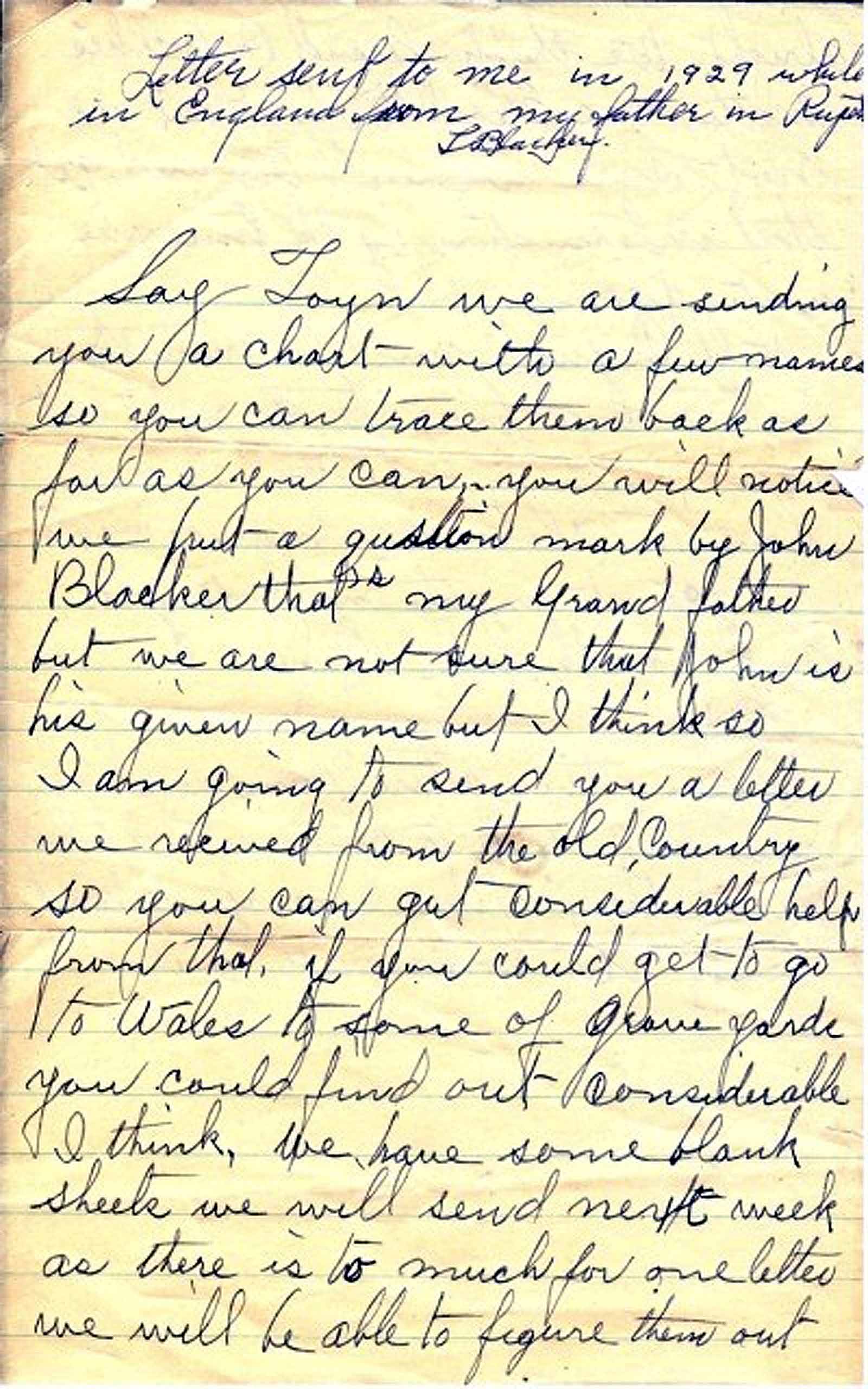
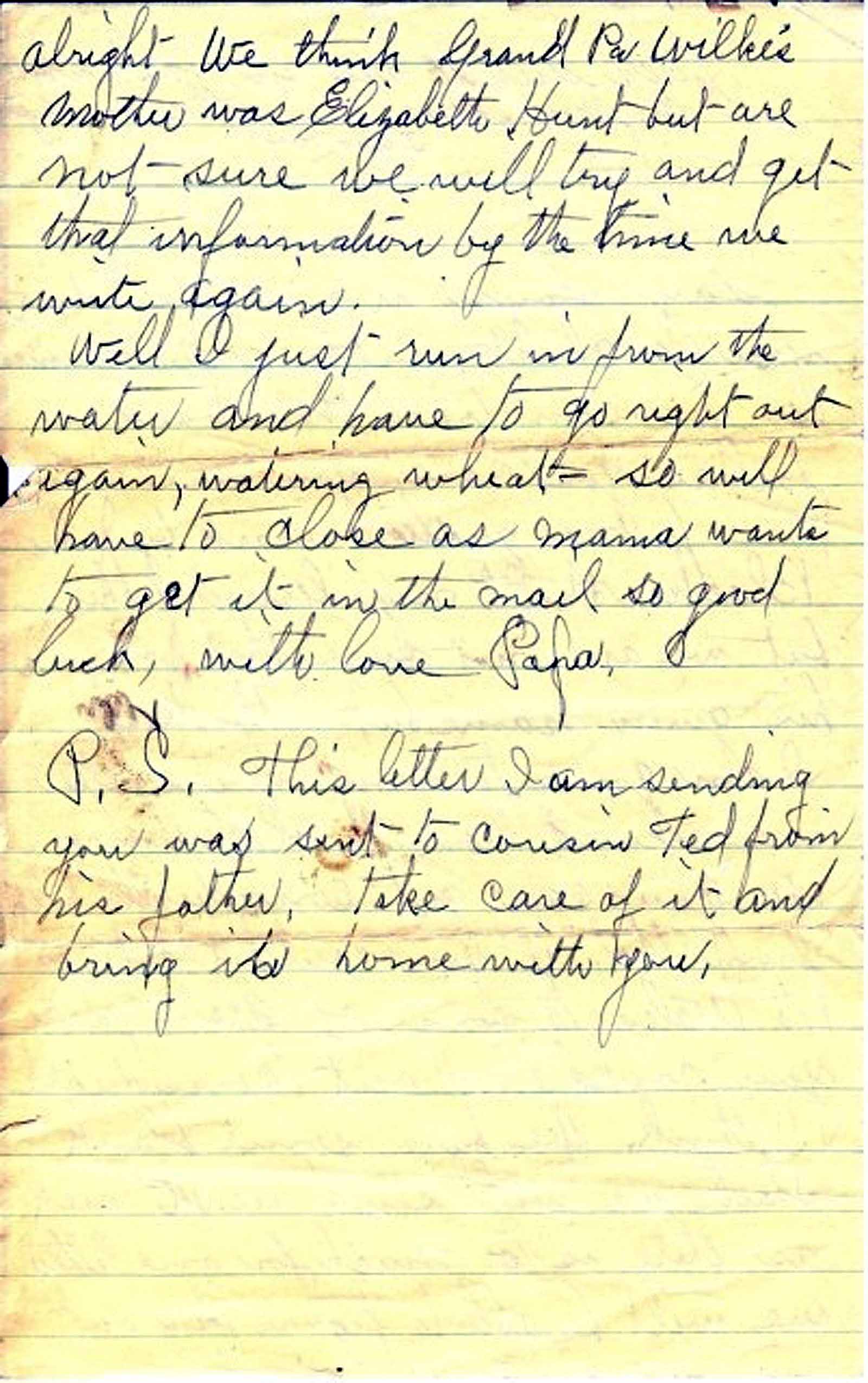
Not only was it suggested that I make an attempt to gather information on the Blacker lines, but Mother's father was born in England and naturally, she was likewise interested. Following the above suggestions from my father, he continued his note: At this junction in this story I must make mention of the fact that my father, Thomas, and his brother, George Blacker of (then) Cumberland, Wyoming, had been approached by a cousin, William Edwin with the nickname of Ted who lived at 9 Palace Row, Cwmtillery, Albertillery, Monmouthshire, England to 'sponsor' him and family to immigrate to America. To sponsor someone from another country who desired to come to America with the intent of permanent residency and eventual citizenship, one or more responsible citizens of this country had to agree to become wholly responsible for the immigrant so far as employment is concerned.
Ted appears to have had expertise in iron works such as blacksmithing and welding. His earliest correspondence to Dad is not at hand and certainly George must have played an important part in making enquiry for employment. Ted did not end up in either Cumberland nor Rupert, but, instead, in Evanston, Wyoming, a railroad town. It seems most likely that it would have been Uncle George who inquired after work there. It was abut this time that Uncle George was serving as Wyoming State Mine Inspector and would have had more influence finding work with iron than would Dad out on the farm.
The earliest letter from Ted to Dad that we have in our files is plainly not the first he wrote. Liberty will be taken to quote from his letter for surely they have not been copyrighted. He, long ago, passed away, according to his headstone, in 1950, and is buried in Evanston.
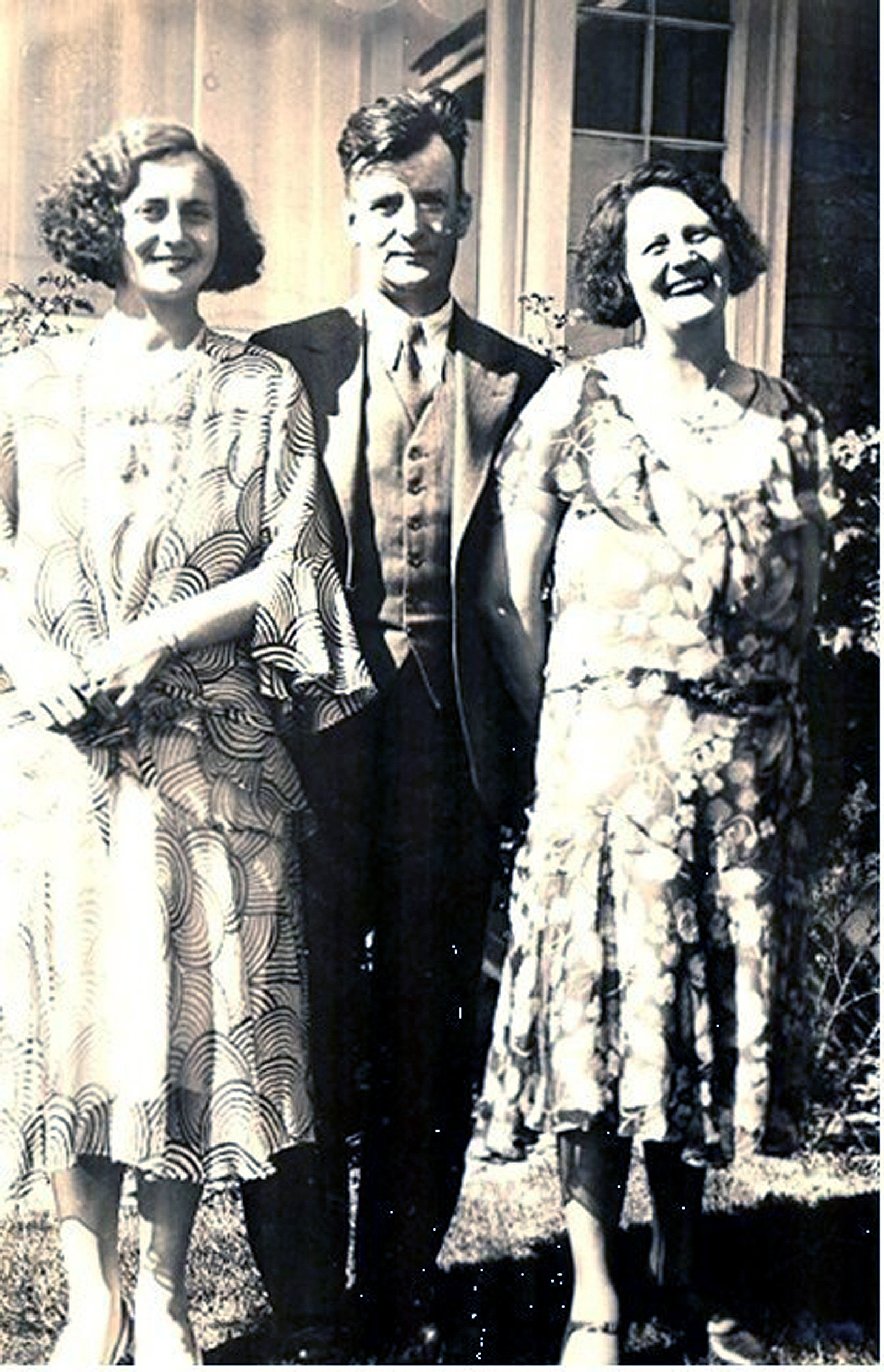 After coming to this country in 1927 Ted, son of William Blacker of Penrhiwceiber (Ted from Abertillery) was joined in Evanston, Wyoming by his wife Rose and children. Above is shown May with her parents in 1930
After coming to this country in 1927 Ted, son of William Blacker of Penrhiwceiber (Ted from Abertillery) was joined in Evanston, Wyoming by his wife Rose and children. Above is shown May with her parents in 1930
15 Feb 1926
Dear Cousin & Family,
I cannot tell you how pleased we were to have a letter from you. Thanks very much for the same. I fancy by the tone of your letter you must be a man after my own stamp - straight and to the point. Well, I am going to call you Tom now, and I want you to call me Ted. Yes, I am going to Mountain Ash on March 6th as Abertillery Football Club are going to play at Mountain Ash and, of course, me being an old footballer from Mountain Ash I always try to see this game so will call and ask my father for the information you require as he is the only one that can tell me and he can also tell me where to get any information that he does not know about. (Dad had, undoubtedly made inquiry for genealogical information in a letter to Ted. We don't appear to have that information, which may have eventually come in answer to the request. L.B.)
"Of course, Tom, my father and I are the only Blackers that are left here now. (I don't know just what he meant by this for I personally met a couple of his mature brothers when there a few years later. L.B.)
"No, it is no trouble whatever to do what you want me to as I shall be only too pleased to do it. And, again, I thank you for being so kind to see about the affidavit. I have not been shown much kindness with my own family here so you will understand how I feel about what you are doing for me. Some day I will tell you all about it.
"Well Tom, you say you would like to see my father and Aunt Mary. Why not come on a visit before we come out? I have not got a grand place but such as I have you are quite welcome to share, in fact, any of you that would care to come and stay with us, and I am sure you would enjoy yourselves the time you are here. (I am sure this would have been very true had Dad ever visited over there for, after all, he, Dad, was born just a few miles from either Mountain Ash or Abertillery. His parents were born and raised in this area and his grandparents had spent half their lives here. L.B.)
"Well Tom, you have got a large family. I thought I had a large family but you have beaten me. My wife is very fond of children and that would just suit her in amongst your children. Is your family all boys or all girls. (nine boys, three girls. L.B.) I have five - three boys and two girls and they are about as much as I can manage. Enclosed you will find photographs of my two eldest children. (Sorry, but they seemingly have not been passed down. L.B.)
"Sylvia May, we call her Mayo, she will be 17 years of age on the 5th of April and Willie Albert, 16 years on the 11th of July. He has done 2 years in the Engineering Shop and he's no fool at his work although it is I that say it. Mayo is a "pianist" (she was and is, indeed. If memory is correct she eventually graduated from a Conservatory of Music in London before coming to the States. She is presently May Burleigh of Evanston and has been a very popular organist and pianist in the community since arriving here. We heard her play at a funeral as late as 1981 and she undoubtedly will play much more despite the fact she is not as young as she once was. She became a widow in 1967 when her husband, Leonard, passed away. L.B.)
"Well Tom, we were so sorry to hear about your sister, Sarah Ann. What a terrible thing it must be for her and for those around her to see her suffering like she is and no hope of her getting better. I hope your wife and family are in the best of health as we are quite well and I think that a lot to be thankful for.
"Well Tom, I would like it better than anything else to bring the family all out together, but it cannot be done for the times have been very bad here since 1921 and the wife has been pretty plucky through it all, so I and my eldest son will come first and we will work to get the rest of the family out after as they will stay with the wife's mother but it will be a wrench to leave them behind, I can tell you.
"And again about what you have to do about the affidavit. I am sending a copy as near as I can find out but I daresay, if you take it to a judge he will alter it some but whatever they do I want you to understand I do not want to be any encumbrance to you in any way. Well, in plain English as we do say, I only want a fair deal for I cannot see any prospects whatever in this country for my children and I am not afraid of work as I have always worked hard.
"You want to know when I am coming out - well that is hard to say as I have got to have an affidavit, then send it with the passports to the Consul, then I have got to wait to have it visaed and wait my quota then I have got to go to Southampton and be examined by the American doctor then when I have been to Southampton I can come any time within three months after passing the doctor so goodness knows how long I will have to wait but anyone with an affidavit can come quicker and easier so you can see how I am situated. I have got the passports ready. As soon as I have got any information I will write and let you know. When I go to Mountain Ash I will get a few picture post cards and send on to you. I think I had better finish or you may get tired but if we were together I could tell you lots more.
"With best of love to you and all the family,
I remain,
Your sincere cousin,
Ted Blacker
The family calls me William Edwin but I am known throughout South Wales as Ted
Blacker."
By the 8th of April 1926 is another letter from Cwmtillery:
Dear Cousin & Family,
"Many thanks for your kind and welcome letter, and also many thanks for going to all the trouble in having the form filled in. I hope to be able to pay you back some day after I have settled down in the States. I have had a letter from Kem Blacker and I have written back to him. (This must be Uncle Kem of Salt Lake City, Dad's youngest brother. L.B.)
"Dear Tom, I went to Mountain Ash and also called to see my father at Penrhiwceiber. (Penrhiwceiber is a small place about two miles out of Mountain Ash where Uncle William lives. L.B.) My father is looking very well considering he is getting on in years - he is drawing near 70 years of age and keeping very well. (I reached that milestone a few years ago and perhaps never realized I too must be reaching maturity. L.B.) He told me a few things and he said if I would wait a little while he would get all the information and send it over to me as he would have to look it up and send away to a few places so I am now waiting to hear from him. As soon as father sends it to me I will send all the information out to you. (Here he has reference to family information. L.B.)
"Dear Tom, the wife and children are very flattered over your remarks about the good looks. Well there is one thing about it, the wife and all the children are worth looking at and she has been a good pal to me and helped me get in the position I am to day.
"Dear Tom, I have not had a letter from George Blacker. My father was saying that G. Blacker wrote to him about 12 years ago but father never answered it. I am wondering whether George is offended over that.
"I had a letter from the American Consul at Cardiff telling me that I would not hear anything from him until July as I missed the last quota. Of course only so many are allowed to land in the States from every country and I just missed the last quota so by what he said in his letter to me that when he did send for me in July if I passed all the tests that I would have four months to get every thing ready and be in the States in that time. So far as I can see now I will be coming out there about October or November. It will not be a nice time to come out but it cannot be helped.
"Dear Tom, you asked in your letter where I intend making for when I come out. Well, if I thought George Blacker could find me work in Wyoming I would go there for a start, but if not, well I think the best thing for me to do as you must remember, I want to be sure of work during the winter, is to stop in the mines in Ohio or Pennsylvania as there are plenty of folks from our part there and work there during the winter then when the winter is over I would like to come out farther then get the boy in an engineering works and I would go in for construction work. I would like to start work straight away as I am not one that wants to be loafing around. I can look around for something while I am at work. Although I would like to hear from G. Blacker to know if he could get me work. I do not mind what it is for a start. Well dear Tom, I think I will close now. I am sending you a few postcards off hand when I was in Mountain Ash. I tried to get one of the Bush and Rose Cottage when Grandpa used to live but failed. As soon as father sends me the information I will send it out to you so goodbye and good luck. With the best of love to you and all the family.
I remain, Your loving Cousin Ted Blacker"
Slightly over three weeks later another letter was received by Dad.
1 May 1926 Dear Cousin and family,
"As I promised you that when I received any information about the family that you asked for I am enclosing a letter that I received from my father. I thought it would be better to send his letter to you so that you can see it exactly as he wrote it. And by what he told me of course you can see in the letter there must be a lot of Blackers in America somewhere as Grandfather Blacker (he is now referring to John Blacker -father of Ted's father, William, as also father of my grandfather, Edward. L.B.) had four brothers come out there. (These brothers of John were George, William, Charles and James. From the record it appears that George may have come later for two of George's sons came to America - William and Albert - which might indicate that their father came later. William and James came in 1854The passenger manifest for the arrival of the ship Tempest on 7 July 1854 lists William Blacker,his wife Sarah and their daughters Margaret and Elizabeth. James Blacker was not listed on the manifest. Perhaps his name was inadvertently left off or he may have arrived at a different time. and brother, Charles while still single came and lived with James and his family. Charles became a captain in the Civil War. More will be written of these families later. L.B.)
"I see by my father's letter that he forgot to put down where his brothers and sisters were born. I will be going over to see him again sometime when I can get away from work and I will ask him about that.
"Dear Tom, the work is looking very bad just now. The men's leaders and the mine owners are meeting and Parliament are looking into it as well. Unless something is settled all mines will be closed down after this week, so we are hoping they will come to terms and avoid a stoppage as the country is in a bad state now.
"Dear Tom, now if there is anything else you want to know abut the family let me know and I will write to my father and he can look it up and get it ready for me when I go to see him. I hope you and the family are in the best of health as we are keeping very good just now. There is one of our cousins in New York. I had his address from my father. He is Aunt Sarah Ann's son. (Sarah Ann is Grandpa Edward Blacker's youngest sister. She married a David Gethin. When I was visiting in Uncle William's home in 1930 - four years following Ted's letter, Uncle William said the Gethins were in Loraine, Ohio. The impression I received was that they were alive at that time. L.B.)
"Well, I will close now. With kindest regards from your cousin Ted Blacker
"P.S. I have not had a letter from G. Blacker yet. I wrote to him but I do not know whether I had the right address as I put on the letter G. Blacker, Cumberland, Wyoming although I should think that address ought to find him."
On the 30th of November 1926 Ted's wife, Rose, wrote but, regrettably, someone clipped the address portion out of the letter which also cut into three lines on the back of the sheet. This letter was on but one sheet - front and back - therefore, I shall not attempt to copy it verbatim. There is also one page of a second letter, also from Rose, however, the first page of the second letter is missing as well as the ending of the letter. (After Dad, Thomas, passed away I asked the family for permission to place any old letters of genealogical value of his in my personal file for just such use as this.) In lieu of copying the portion of Rose's letters I shall copy excerpts only. No date is included in the second letter. I rather think it to have been written subsequent to the letter of 30th November, however, of this I am not certain. Undoubtedly Ted, himself, must have written after the above last letter and if he did, no letters have been preserved. Now to excerpts from Rose's letters:
"I can't tell you how I feel about you being so kind and prompt over the affidavits. We have been through such hard times and no one has ever been kind to us before. I feel just full up, and I expect it is because the men are going to start to work this week, it has fairly bowled me over, really." (Apparently the mines were closed down. In Ted's May 1st letter he said unless the labor contracts were agreed upon the mines would close down at the end of that week. L.B.)
In the cut up letter Rose is writing of seasickness, apparently of what she anticipates when they get on board a ship and says,
"--- but I have not tried a motor car yet. I have never been in a car in my life yet, so I don't know what it is like, but really I am the joke of all the company, when we go for a trip anywhere, but I will get over it someday, that is about all the illness I've ever had, but I've had a gastric stomach for a couple of weeks now so I must get rid of it quick and then I shall be about fit to have a ride on that horse you've promised me, to see if I can't get horse-sick. That will be about all I think, so now I must close or I will be too late for the post."
In what I suspect is the subsequent letter but no dates are at hand for only a middle page is available, Rose writes:
"Dear Folks, you say it won't be long before we can all come out after Daddy's been there awhile and we are making up our minds its not going to be long because I shall never like this place after Daddy is gone.
"Dear Tom, enclosed you will find a letter from Grandpa Blacker with the information you were asking for, and if there is anything else you would like to know, well please send and let us know. Of course Daddy told you he was going to sail on the 26th of January. I hope it will be fine for his journey across the water, there's one thing, he is a good traveler".
Thus ends the correspondence from Ted and Rose, which we have inherited and now being used some over 55 years following their writing.
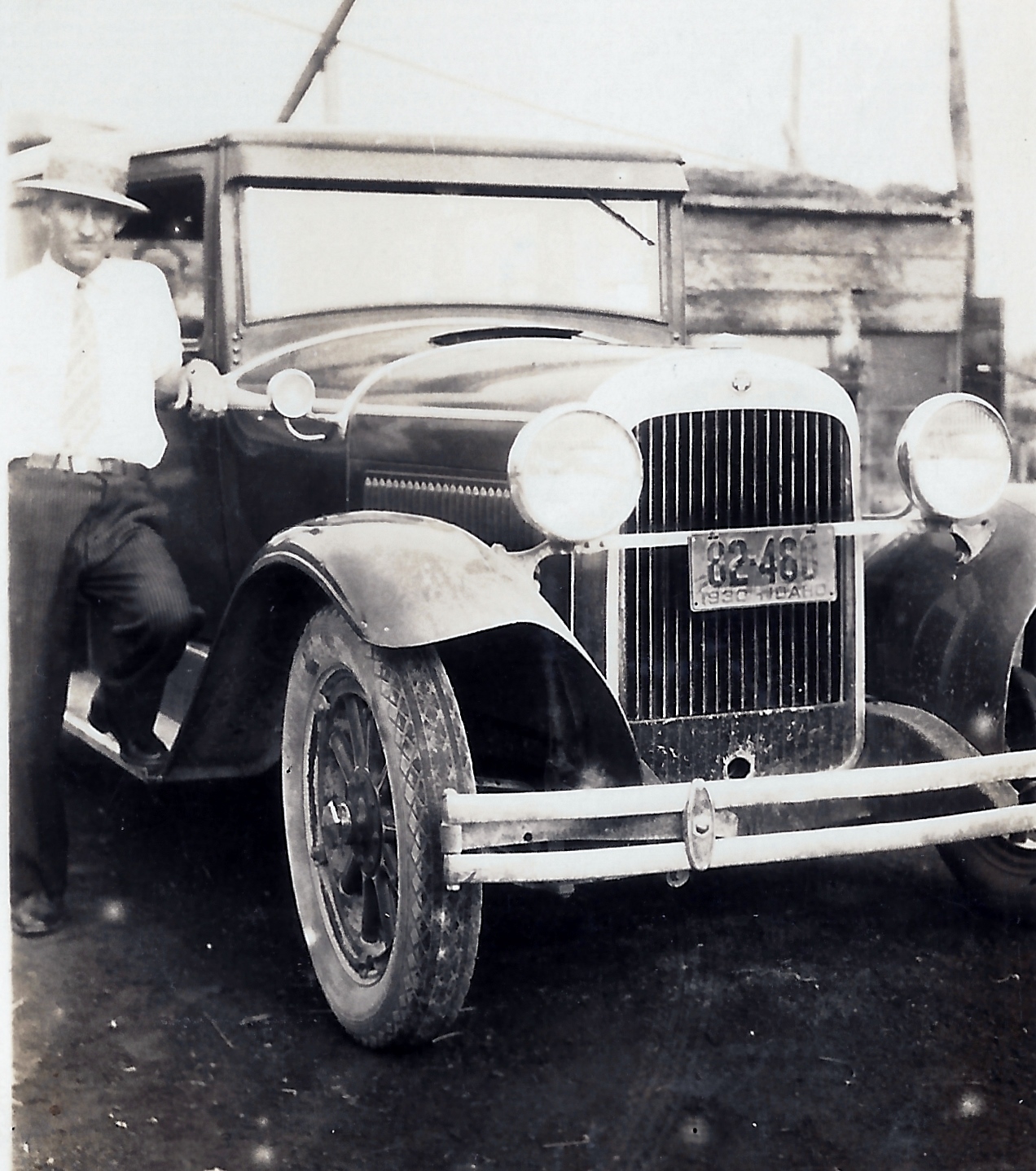 Me with my car about 1934
Me with my car about 1934
If Ted sailed on the date quoted above from Rose's letter - 26th of January - it would have been January of 1927. Undoubtedly Uncle George of Cumberland, Wyoming located work for him.
Sometime during the summer of 1927, Dad and I traveled to Salt Lake City in our Model T open, two seated Ford and visited with Uncle Kem (Dad's youngest brother) and his wife, Aunt Marie Blacker. After a couple day's visit there, we visited with Uncle George and Aunt Merintha Williams, who were living in Salt Lake. As I remember it was the second day following our arrival in Salt Lake, that Dad and I in our car and Uncle Kem and Aunt Marie in their Model T coupe, started reasonably early and drove to Evanston purposely to meet cousin Ted. Apparently, Dad knew where he was employed and the two cars of us went to the Union Pacific Railroad Co. round-house. There, in that building, railway engines could be turned around. This was quite convenient for most trainloads of freight leaving Salt Lake and Ogden had to have engine help to pull the long, heavy trains from Ogden to Evanston, for there was an elevation increase of 3,000 feet from the about 4,000 feet altitude at Ogden, to over 7,000 feet altitude at Evanston. From Evanston eastward, the extra engines were not needed and could be turned around at the round-house and return to Ogden without backing up all the way.
As we stopped at the round-house, Dad inquired of a man in the yard about Ted. Dad and I were led into the building to a forge where Ted was heating a piece of iron and pounding it on an anvil with a heavy hammer. The man from the yard spoke to him and told him we were looking for him. This was our first meeting with Dad's cousin who had come directly from Wales. We went into the yard to where Uncle Kem and Aunt Marie were waiting and for probably thirty minutes had a get acquainted visit.
At that time Ted's family had not arrived and from this distance in time since this visit, I do not recall how soon Ted was expecting them, but eventually the family was reunited. I should ask May, their daughter, who as stated earlier, is living alone as a widow of several years in Evanston.
For several years Ted and family lived in a nice well-kept frame home in a nice, but modest residential area, in the then southeastern portion of Evanston. From memory I would say on Sage Street in approximately the 400 block. If our memory serves correctly, the children were May, William, Clifford, Edna and Ronald.
Ted continued his work with Union Pacific until retirement and by then he was a widower. The family was saddened by the car-accident death of their youngest, Ronald J., as I recall the summer following his graduation from the Evanston high school when he was about 19 years of age. At this time the city of Evanston had found it necessary to open up a new area for burial purposes and Ronald became the first to be buried in the new area to the north of the older cemetery.
Two years following Ronald's death Rose, the wife and mother, passed away. We quite frequently in our visits to the Evanston cemetery visit the Ted Blacker burial plot and on one occasion copied the tombstone data all of which reads - on separate stones - Ronald J. Blacker, 1920 -1939; Rose A. Blacker, 1888-1941; and William E. Blacker 1883-1950. The latter being Ted's stone.
The older boys, William and Clifford did not remain in Evanston. As memory serves us one went into Nevada and the other into Colorado. Edna became a trained nurse and moved into California, seemingly to the Los Angeles area. The last we heard she had not married.
At the beginning of this chapter of this account, I quoted a brief note Dad had written to me while I was in Birmingham, England on my mission, in which he suggested I visit Wales if at all possible. As a post script (P.S.) at the end of the letter he wrote, "This letter I am sending you was sent to cousin Ted from his father. Take care of it and bring it home with you". The letter he referred to and which he mailed to me, was the letter Ted referred to in a couple of his letters to Dad which have been copied in this story. I did bring it home with me as Dad requested and which I eventually inherited for my family file. It contained, perhaps, even more than Dad realized - certainly more than I realized when I first read it. Keep in mind this letter from William was addressed and mailed directly to his son Ted, before Ted immigrated.
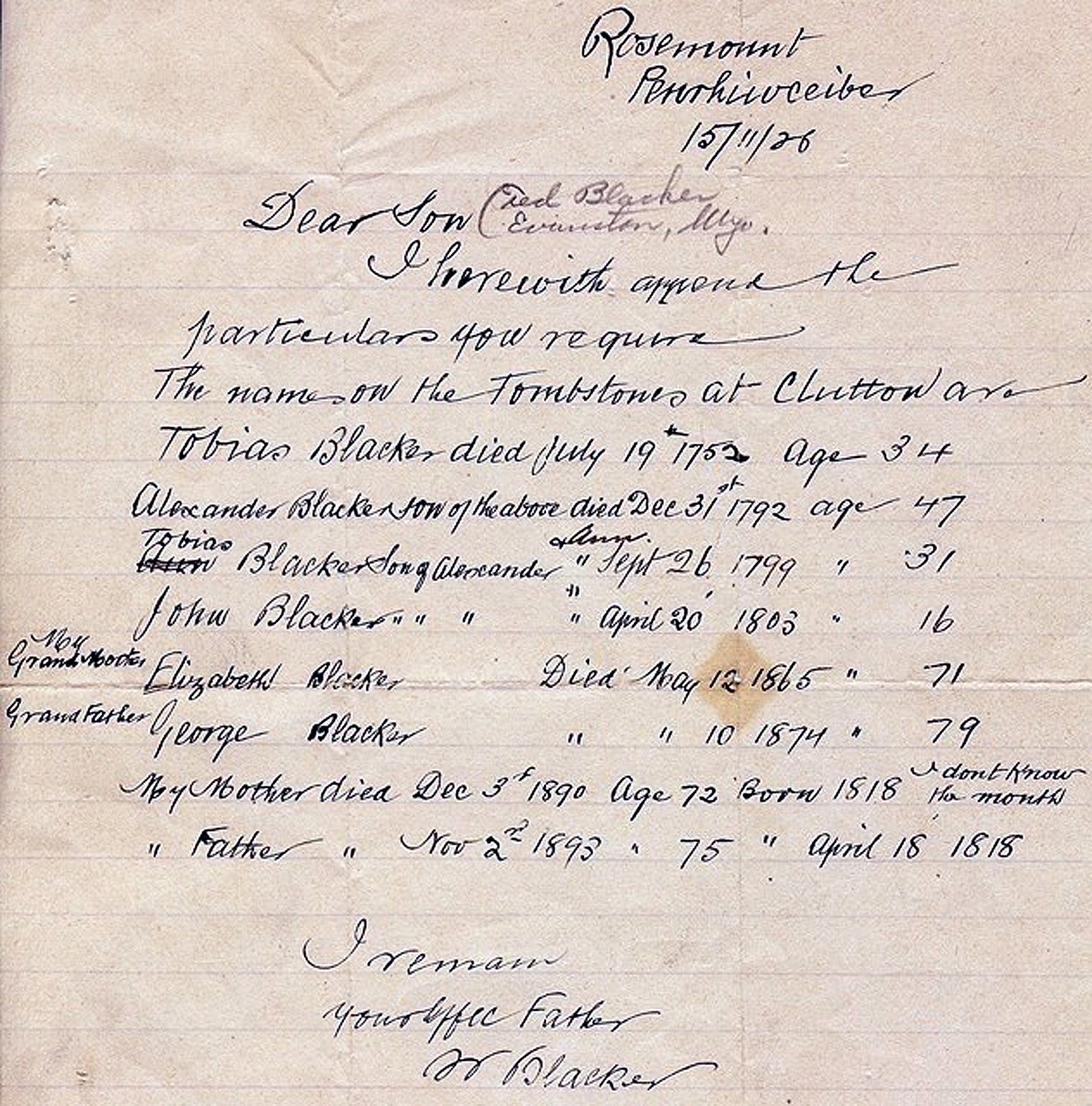
What could be confusing on two points in the above information is that Uncle William, in this letter, does not mention the name of his father. He does his grandfather, but not father, and so when Dad wrote to me he thought his (Dad's) grandfather (which would be the same as Uncle William's father) was John, but he put a question mark by it. (Dad was right in his supposition but the above letter didn't help him. L.B.) Perhaps, to add to the confusion, the information in Uncle William's above letter lists a John, who proves to be an exception to all on his list as being direct progenitors.
Another fact of possible confusion in the information given above is the fact that Uncle William's mother and father were not buried in Clutton. The letter might lead one to suspect that they were for he writes "The names on the tombstones at Clutton are:" This certainly was not his intention for Uncle William's father and mother are both buried in the Mountain Ash cemetery.
It seems appropriate at this point, speaking of tombstones in Clutton, to temporarily drop down in time more than twenty three years to the result of research work done by professional researchers for the family.
In a letter dated 30 August 1949 and sent thru the Genealogical Society to me in Ontario, Oregon where we resided at the time, the English professional researcher hired by the Blacker Family Organization, wrote relative to a particular cemetery stone under which six bodies had been buried. This was a common practice - and still is - in England, brought on because of population. They, for probably centuries, have buried bodies one above another to at least a total of six. Speaking of Clutton the Genealogical Society writes:
"In the churchyard our researcher found the following stone which fits in with the patron's pedigree chart. It is found also on page 7 of extracts No. 5 stone:
19 July 1752 Tobias Blacker aged 34 yrs. being the father of # 16
31 Dec 1792 Alexander son of above aged 47 years being # 16
26 Sep 1799 Tobias son of Alexander and Ann Blacker aged 31 years being # 8
12 May 1865 Betsey wife of George Blacker aged 71 being # 8 on chart
10 May 1874 the said George Blacker 79 years being # 4.
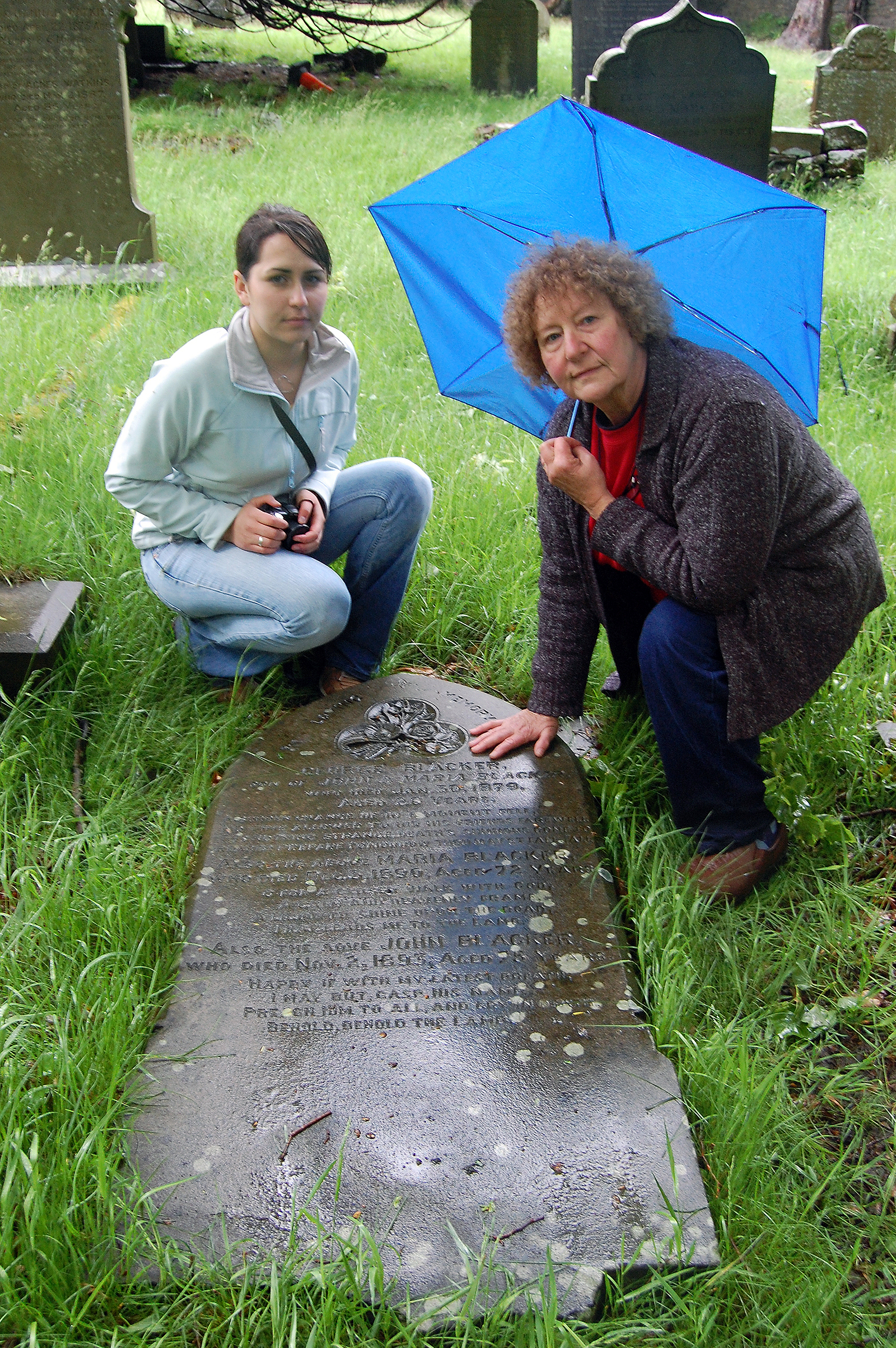 Ruth Blacker Waite and her grandaughter Mariah Waite in the Mountain Ash Aberffrwd
Cemetery next to the tombstone of John, Maria and George Blacker
Ruth Blacker Waite and her grandaughter Mariah Waite in the Mountain Ash Aberffrwd
Cemetery next to the tombstone of John, Maria and George Blacker
This is indeed a remarkable stone showing four generations of the family."
It would be interesting to know how Uncle William got his tombstone information. He didn't mention that it all came from one stone which, undoubtedly it did, even though he has 16 year old John included. Note that the researcher, following his account of the Tobias born 26 Sep 1799 says, "further down the stone" as if to say he was missing an entry. The second to last entry is of Betsey (Elizabeth) who, of course, is an in-law to the family.
Also note that the first Tobias lay alone in the grave for forty years and more before his son, Alexander, joined him. Also, of interest is the fact that the grave had been closed, following young John's entry, for over 60 years when Elizabeth Bowditch Blacker, my great, great grandmother was buried with all those men.
The stone of which we are considering has been a great help in our research work particularly our early research work in the 1930s and 1940s - for it brought evidence which proved we were on the right track. To explain: as any of the Blacker family who has a copy of the family group sheets has already become aware, there were several Tobias names as well as Alexander names, all Blackers of course, and care had to be taken to get them to fit properly into the correct families. Tobias Blacker and Mary Sage were married on the 7th of December 1796, as was verified by Reverend Galloway's parish records of marriages, which he sent to me in his letter of 7 May 1957. Mary Sage was listed as being from Cameley.
In a letter from a man whom I have already introduced, Frederick Blacker of Clutton, stated on the 21st of August, 1939, "Your great-great grandfather, George Blacker was born 4 March 1795." This George and Frederick's father were cousins and Frederick, being interested in family records had George's birth record in his possession.
There remained an unproven connection due to the fact that George's supposed parents, Tobias Blacker and Mary Sage, over a year and a half after the birth of this supposed child of theirs, were now being married, according to the letter from Reverend Galloway. Did this George belong to another set of parents? The fact that the marriage entry said Mary Sage was from Cameley, which is a parish near to Clutton, three miles west and to the south slightly - we wrote for a search of the Cameley birth records of that period to see if this George's christening was recorded and whether or not he was attached to the name of Mary Sage. In reply, the researcher sent us a copy of a christening entry, "1796, August 23 George Blacker, son of Mary Sage and Tobias Blacker". Our findings confirmed what we were suspecting. Note that the baby which Frederick Blacker said was born 4 March 1795, was not christened until he was nearly a year and a half old, which is not at all unusual so far as age is concerned. The christening confirmed the baby's parentage, which we were hoping it would, despite the fact that the parents were not to be married for yet another three and a half months.
To lay aside any further question, for certainly we and the researchers have endeavored to verify every record from every possible angle, this extraordinary tombstone again reconfirmed our findings that George's father was our Tobias who, himself, was christened in Clutton 16 Oct 1768, the son of Alexander and Anne Blacker. The tombstone tells us that he, Tobias, died when he was but 31 years of age. Speaking of early deaths, did you take time to examine from the tombstone record that Tobias' father, Alexander was only 47 years of age when he died? His father in turn, another Tobias, was only 34 years of age. George's and his wife, Betsey's (Elizabeth) ages at their deaths were nearer normal.
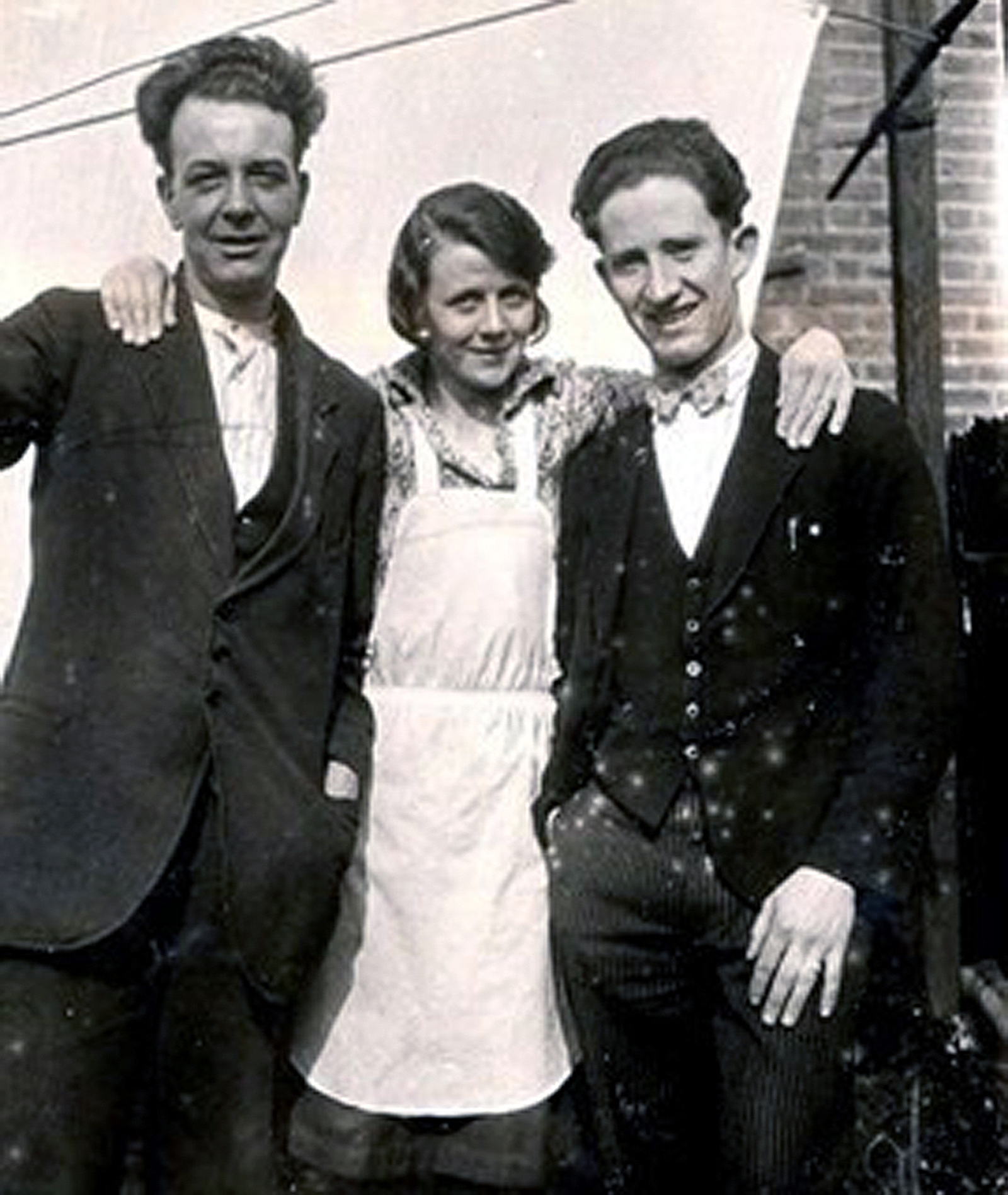 Alfred, his wife May, and Loyn Blacker
Alfred, his wife May, and Loyn Blacker
Frederick K. Blacker of Clutton has assisted greatly with our family history and genealogy. I have always regretted that he was not at home on the day I visited Clutton, 3 March 1930. I really don't know how much more he could have helped us than he did through our later correspondence, for we corresponded many times between my return home and his passing in 1948 at the age of 80. This was reported by his daughter, Freida who wrote the last letter from Clutton. She and her brother, Charles took over the business of "F. Blacker & Son, Monumental Sculptors" whose letterhead announces it to have been 'Established in The Year 1716'.
Actually, Frederick wrote his first letter to me on 16th March 1930 and mailed it directly to Rupert. By checking dates now, I find I was in London on that day from whence we (my home returning companion, who had served as my clerk in the Birmingham District for a few months) boarded the S.S. George Washington in Southampton, the 19th of March for our water voyage home.
Speaking of London, I must not overlook the fact that I had been given the London home address of Aunt Mary Blacker Watkins' son, Alfred and his wife May. Alfred was a bus driver for the Metropolitan London Bus Company. During our three or four day stay in London, we visited their home and they insisted that we return for dinner the next evening, which we did. We certainly were made welcome in their home. We corresponded two or three times after I returned home.
I have much more I wish to write about my visit with Uncle William and Aunt Mary, for from them comes the story of various branches of the family coming to America, therefore, for continuity of families and events it seems more appropriate that that portion of this story be delayed until after we share some space with Frederick K. Blacker as I have just intimated.
Below are copies of letters - and/or excerpts - received from Frederick K. Each letter is on business letterhead stationery.
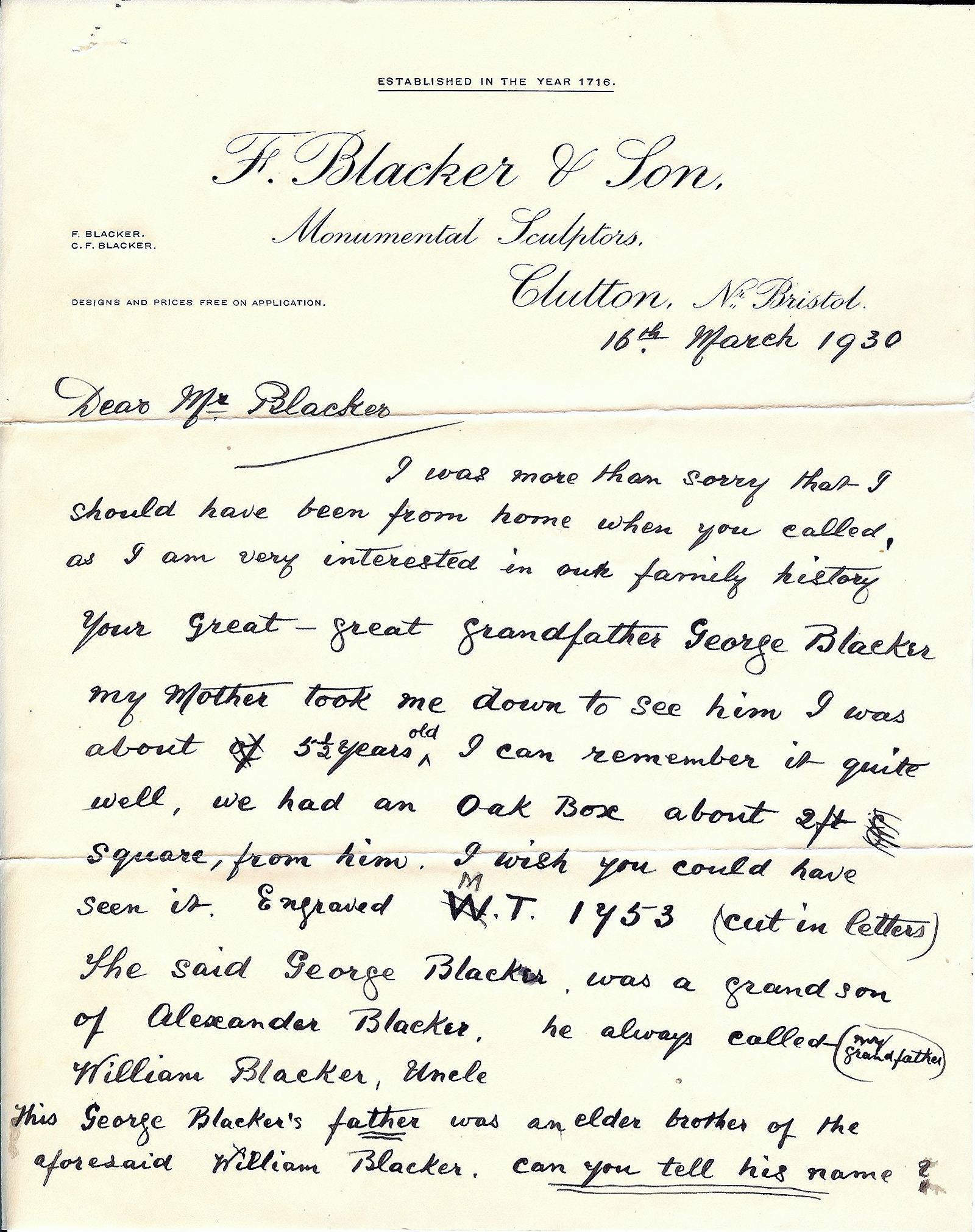
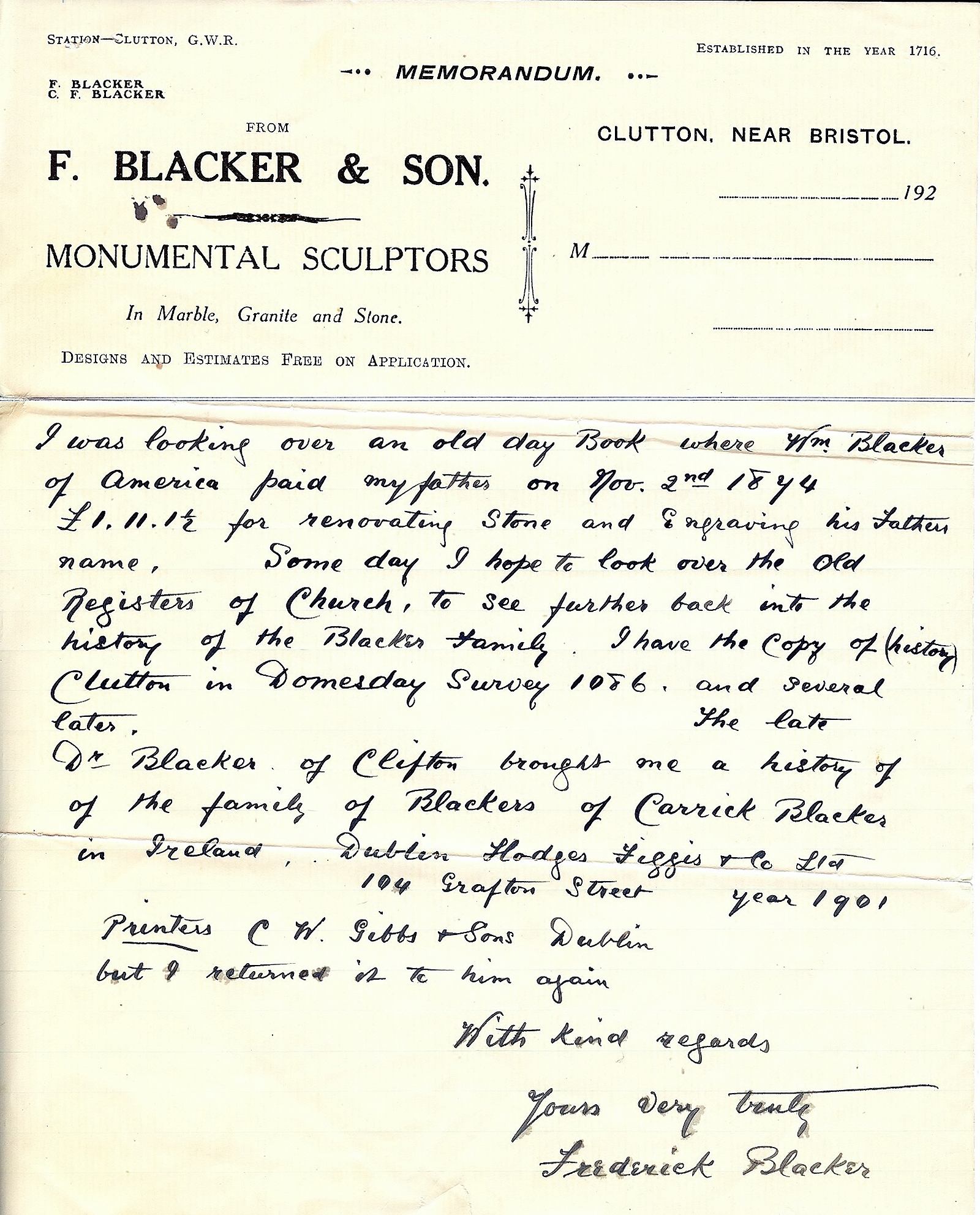
-
I was nearly 6 years old went with my mother. I can remember well. Box 1' 9" x 1' 4" x 8" deep given to me in 1874 in George Blacker's house. A person was keeping house for him named Maria Willison.
-
M T 1753 is rubbing below, letters sunk in with lock to fasten with key sunk level with wood work. I am going to find out who this M T was.
-
Tobias Blacker, a monumental sculptor entertained John Wesley about 1739 the day his house and works were in part of Clutton churchyard. There are records of this. His son Alexander carried on the business after. He was a wonderful letter cutter. I will try and send you a rubbing from a head stone he done." (He apparently overlooked the latter. L.B.) Time away from the letter for comments: With this letter, Frederick enclosed a lighter weight paper than the paper weight he had been writing on, and slightly rubbed with soft pencil lead until the letters M T and the date 1753 showed up. To the side of the lettering he wrote three separate notes that can be seen here:
Let us return to two or three items mentioned thus far in Frederick's letter. For closer and more interesting examination of the people Frederick is referring to it would be wise to examine your own personal pedigree chart or, even better, the family group sheets from your own Book of Remembrance, if you happen to be a descendent of this early family.
In the second paragraph of his letter from which we are now considering, note that he recognized that George Blacker was my great-great grandfather. At the end of the paragraph he identifies this same George as being a grandson of Alexander and a nephew of Frederick's grandfather, William. Interestingly, as you will be able to follow from the brief pedigree chart shown on the left, Alexander who married Ann Naish is ours and Frederick's common ancestor, our Tobias who married Mary Sage was a brother of William, Frederick's grandfather. Our Tobias and Mary Sage had three children, two girls and a boy, George. George was the eldest of the three children and his father (Tobias) died when George was but four and a half years old. His sister just younger was nearly a year old at the death of their father and his still younger sister Hannah would not be born for another four months. Tobias' death was tragic to the little family. We have no information of the type work this Tobias was following - his father, Alexander operated the monumental sculpturing or grave stone business - and Tobias could have been helping with that business. There were six other boys of the family who grew to maturity so we can be almost assured there was not room for all to help their father and besides, Tobias was the oldest of the family. Another little brother died as an infant - so there remains little question but that Tobias had to leave home and find other work, particularly following his marriage. He could have become a farmer or a farm laborer or a miner, for coal was mined in Clutton, particularly from the surface of the ground. This area was still rural, but yet relatively close to the big port city of Bristol where manufacturing was going on and, of course shipping. A man-made inland canal was not far from Clutton, heading inland from near Bristol and it required laborers and teams to traffic the goods on the canal. Tobias could have been working at any of a number of trades, but nevertheless upon his early death at the age of thirty-one, his wife and babies were probably devastated.
To ease Mary Sage Blacker's problems, the little four year old (my great, great grandfather to be) went to live with his grandparents - Alexander Blacker and Ann Naish - and it was they who, it is reported, raised him. Grandpa Alexander had a large family, fourteen in fact, with one having died prior to their married son, Tobias, whose partial story we are relating.
Frederick's grandfather, William, was only ten or eleven years older than nephew, George, and so when George went to live with them, William would have been about 15 years of age. Living conditions were simple and hard then - approximately 180 years before the time of this writing - and children had little, if any, schooling opportunities and they learned to work at a very early age. Children were seen and not heard, they tell us, and certainly learned to respect their elders. This is probably the reason little George always called Frederick's grandfather, George, Uncle George.
Frederick was going to find out who the M T initials were for. We never heard more about it. The third note is most interesting for it goes back to the father of Alexander who was the grandfather to the little George of whom we have been talking.
Please note that back in this generation my fifth great-grandfather, Tobias (earliest Tobias on pedigree, christened 1718) who was Alexander's father, was the operator, and probably owner, of the monumental sculpturing business. This business was headed by Frederick when he wrote this letter of 1930 of which we have just been considering. According to note #3 contained in that letter, Frederick tells us that Alexander 'carried on the business'. Also, Alexander, apparently had great expertise in letter writing which was part of the job of preparing headstones. As one goes thru the ancient cemeteries, and some not so ancient, one occasionally runs across a beautifully lettered tombstone. Some lettermen took the greatest of pride in their work.
Also, in the same note #3, Frederick mentions the fact that this first Tobias on our pedigree entertained John Wesley about 1739 (could this be a little early? L.B.). The reader is undoubtedly aware that John and Charles Wesley were religious leaders who protested, not only against the teachings of the Catholic Church but, also protested against the Church of England, the state church. At this time the brothers were doing a great missionary service by traveling in many of the communities of England and establishing branches of their new Methodist Church. To break from the Church of England was a serious thing in the eyes of the British king or queen who actually headed the church. They delegated high authority from the Crown to the archbishop of Canterbury with, next in line, the Bishop of York.
The fact that Tobias entertained John Wesley does not assure us that he, Tobias, became a disciple of Methodism, however, when one starts an interest - tampering with it, shall we say - it is good indication he might have become a follower. Whether Tobias joined the Methodist church we don't know. We do know that five generations later, my grandfather, Edward Blacker, was classified as a Methodist and his brother William, at whose home I visited for about four days in 1930, also a Methodist, boasted that for many years he was the organist in the Methodist church in Mountain Ash. Only due to age, did he find it necessary to give way to younger musicians. Also, he sang as a choir boy in his youth before becoming the organist.
It is of interest that Frederick (who wrote the letter from Clutton), sang in his church choir as a youngster as well as when an oldster.
Frederick finishes his letter of 16th March 1930 by stating:
"Dr. Blacker of Clifton brought me a history of the family of Blackers of Carrick Blacker in Ireland but I returned it to him again".
He gave the name of the publishers and printers and the date of 1901, which proves to be another copy of the history such as the copy we have in our files and of which was written in Chapter I.
In note #3, he refers to John Wesley visiting our direct progenitor, Tobias Blacker. The reader will already have been aware that John and Charles Wesley organized the Methodist church and, at that time, went all over England to recruit converts. Their proselyting must have paid off in the Blacker home that night for the Blacker family has, thru the years, been devoted Methodists and after over two hundred fifty years most of the branches of the family remained with that church. It was not for five generations after Tobias, that Edward married a Mormon girl and after carefully comparing the two religions concluded that his wife's church had teachings very important to them, which his own church could not provide.
The small sheet from the daybook Frederick referred to is but 4" wide and 5 1/2" deep and is as follows:
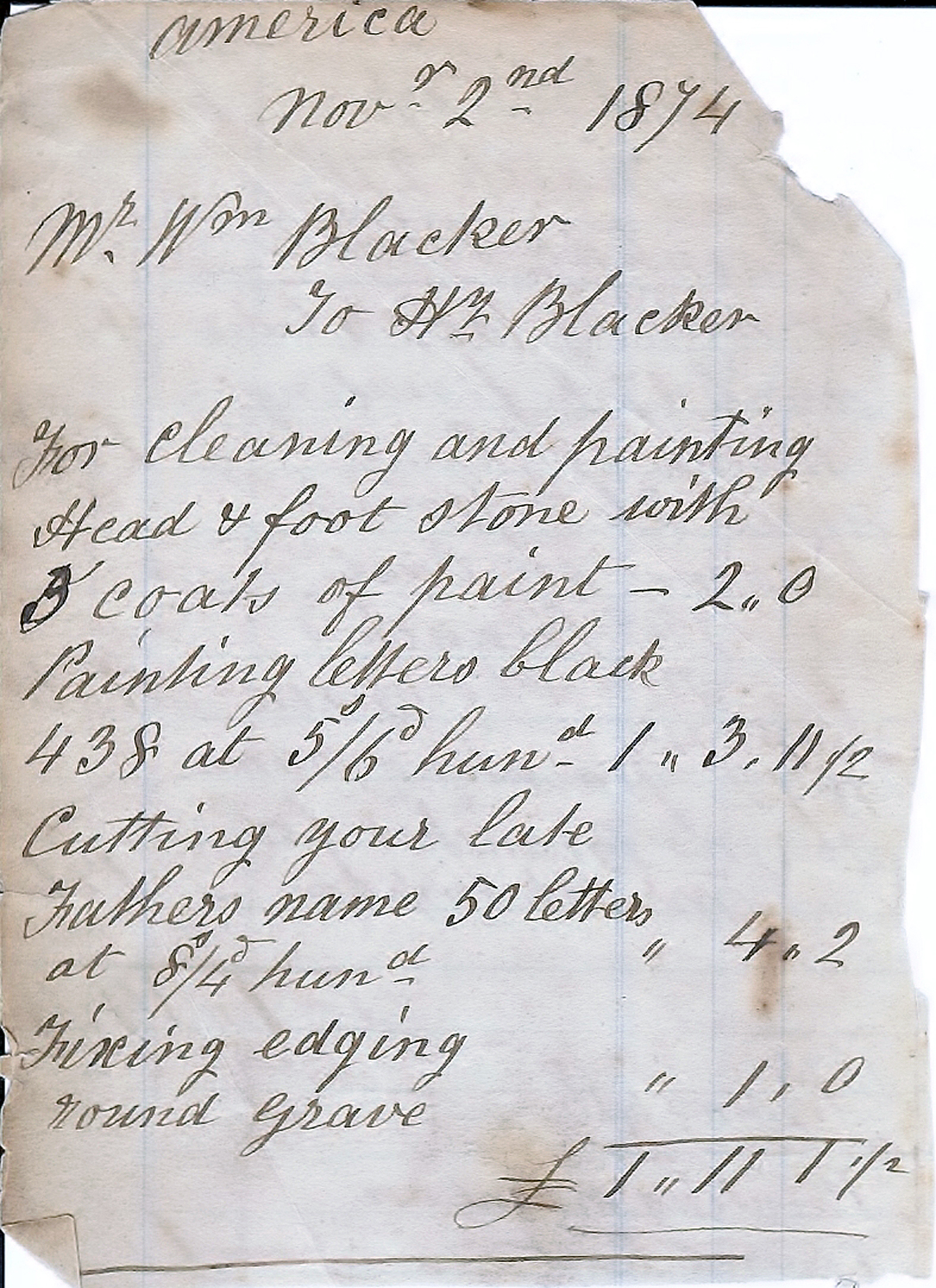
We do not know the exchange value of the pound and dollar as of 1874. In 1930
it would have been approximately $8.00. In 2006 the exchange rate was about
$1.90 to a pound, approximately $3.80.
Ruth Blacker Waite
Along with this letter Frederick enclosed a personal handwritten letter written to him by this same doctor mentioned above, but earlier, in fact it is dated November 28th 1909. Frederick said he took a copy of it and mailed the original to me. Clifton, by the way, is not particularly a small town. It is located just a mile and one-fourth, the gazetteer says, west of Bristol, therefore, it can be considered actually a part of Greater Bristol.
The following is a copy of Dr. Blacker's letter: (Written to Frederick)
20 Victoria Square,
Clifton, Bristol
Telephone 3192
Nov 28, 1909
Dear Sir:
"I am sorry I have not had time to write before. I have a good many notes of Blackers and will look them through again soon and will let you know if I come across anything likely to be of interest to you.
"If you come across any dates of Blacker tombstone inscriptions etc. I should like to have them as it would help to piece together the stray notes that I have collected.
"Your book mentions the 3 Blackers who left Stoke Lane about 1680 (what parish is Stoke Lane in?) But I suppose you do not know their names with the exception of Nicholas.
"The Tobias I mentioned is mentioned in the Well's admons. (Wells is a city in Somerset where the legal documents of the county are kept such as wills, deeds, probates, etc. L.B.) is Tobias Blacker alias Heart, (One record shows the alias as Hart. L.B.) Clutton administered 1685. That is all the information I think that the admons (administrations L.B.) gives. This is apparently the only Tobias that had a will or administration at Wells. he best way is to look through the Clutton register. (I don't believe Frederick ever checked the registers (parish) even down as late as 1930, for in his letters he said that he wanted to. L.B.)
"Alexander seems a very uncommon name for the Blackers. Are you quite sure that his father was Tobias? The only Alexander I can come across is a son of William Blacker of Clutton who (Wm) died 1932 leaving, Alexander B. Tobias B., Ann. (Had the doctor taken his horse and buggy - maybe he didn't serve as a country doctor or had he taken the train to Clutton and checked the "remarkable tombstone of the Blacker family" he would have found that Alexander's father was a Tobias. L.B.)
"If you look up this date in the register - 1732 - it may say in the burial who the father was. (Unfortunately there is no record of a William being buried in Clutton, which doesn't necessarily prove that he wasn't, however, it remains unlikely. This burial probably was in another parish. The 'remarkable' tombstone starts 20 years following Dr. Blacker's death year of the William in question. In all of our search we have not found the death record of our ancestor, William, who was the father of the first Tobias on the tombstone, however, he could very well have been the man Dr. Blacker is referring to. The family group sheet of Tobias' father shows his father, William's last child was born in 1721, so the father's death could very well have been 1732. We have no documentation that it was he. L.B.) (Now, continuing with Dr. Blacker's letter)
"What I want to find out is who was the father of my great-grandfather Samuel Blacker of Clandown. He died in 1806 age 91 and was buried in Midsomer Norton. (Clandown is a small locality about five miles southeast of Clutton but not large enough to have been a parish. Midsomer Norton, as has been previously located, is a parish south and west of Clandown and about eight miles south of Clutton. L.B.)
(Dr. Blacker finishes his letter to Frederick - 1909 - by adding,)
"I want to find his (Samuel's) baptism or that of his brother Abraham. One was born about 1715, the other 1721. But any Blackers are of interest to me.
"If you will call in one day when in Bristol I can show you what notes etc. I have. Believe me
Yours truly, A. E. Blacker"
On a couple later occasions, Frederick sent me names and dates only which have been placed on family group sheets and is shown on the pedigree chart. His letter of 21st August 1939 may be of some interest:
Dear Mr. Blacker,
"I was pleased to receive your letter, and should have answered it before but have been to a nursing home at Easter for an operation - prostate gland, but thankful to say it was successful and although 71 I am at business again.
"I saw our Rector and talked over with him your wishes to your letter and he said in a couple of weeks time he and I would go through the Church Registers and find out the family ancestors.
"Your great, great grandfather George Blacker, born March 4, 1795 used to call my Grandfather William, 'Uncle" although William was only 10 years older than George, his nephew, born 20 Sept. 1785. William was a younger brother to George's father whose Christian name I must find out. I know Alexander was their father and Tobias his father. (As explained earlier in this account, George's father's name was Tobias. L.B.)
"I can remember George Blacker, and John, his son, when he came up from Wales and my father cut his parent's names on the family headstone." (John, of course, is my great-grandfather. Undoubtedly, from this statement John returned to Clutton after his father, George's death and oversaw the cutting of the names of his mother and father, Betsey (Elizabeth) who died in 1865 and his father, George, who died in 1874. Interestingly this seems to be somewhat in conflict with the information from the 'day book' shown. William of America from the 'day book' account was charged for the cutting of his father's name (John and William were brothers, therefore, both sons of George). Could it have been that John came up following his mother's death and had her name cut in? She died nine years before her husband, George. While Frederick says in his letter of 1939 'cut his parent's name' he, Frederick could have been in error as to both names. I shall proceed with Frederick's letter: L.B.)
"This family headstone is in good preservation and you shall have all the names on it. It ought to be cleaned up a little and it would last for centuries. I would go my part towards it.
"I am pleased to say my wife, son and daughter are quite well, both are in the business with me.
"Hoping you are keeping well and if you have a wife and family that they are also. (Had been married 3 years in 1939. L.B.)
With very kind regards, Yours sincerely Fredk. Blacker
P.S. The home we live in now, Grandfather William built 125 years ago. The business before was in part of Clutton churchyard.
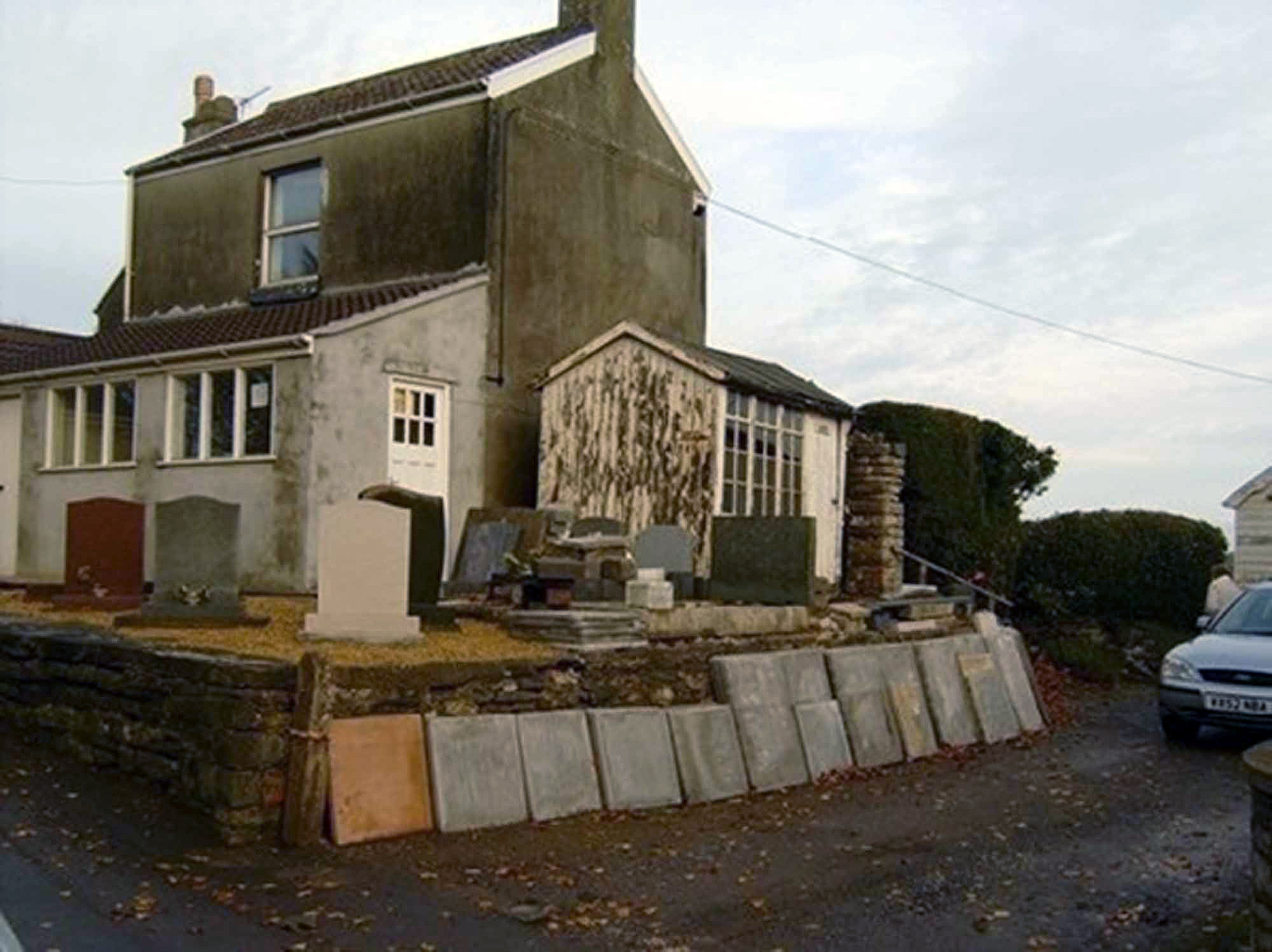
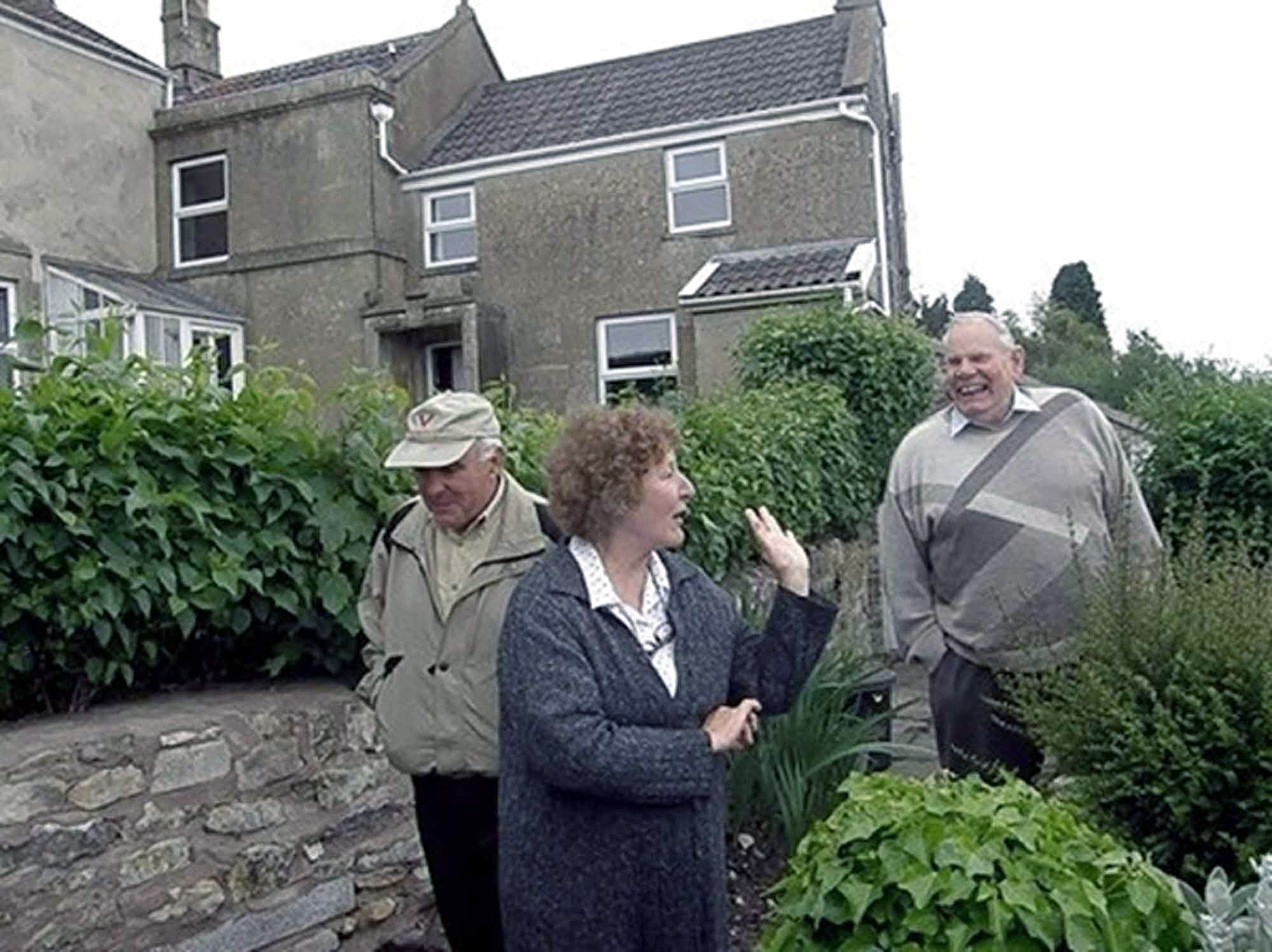
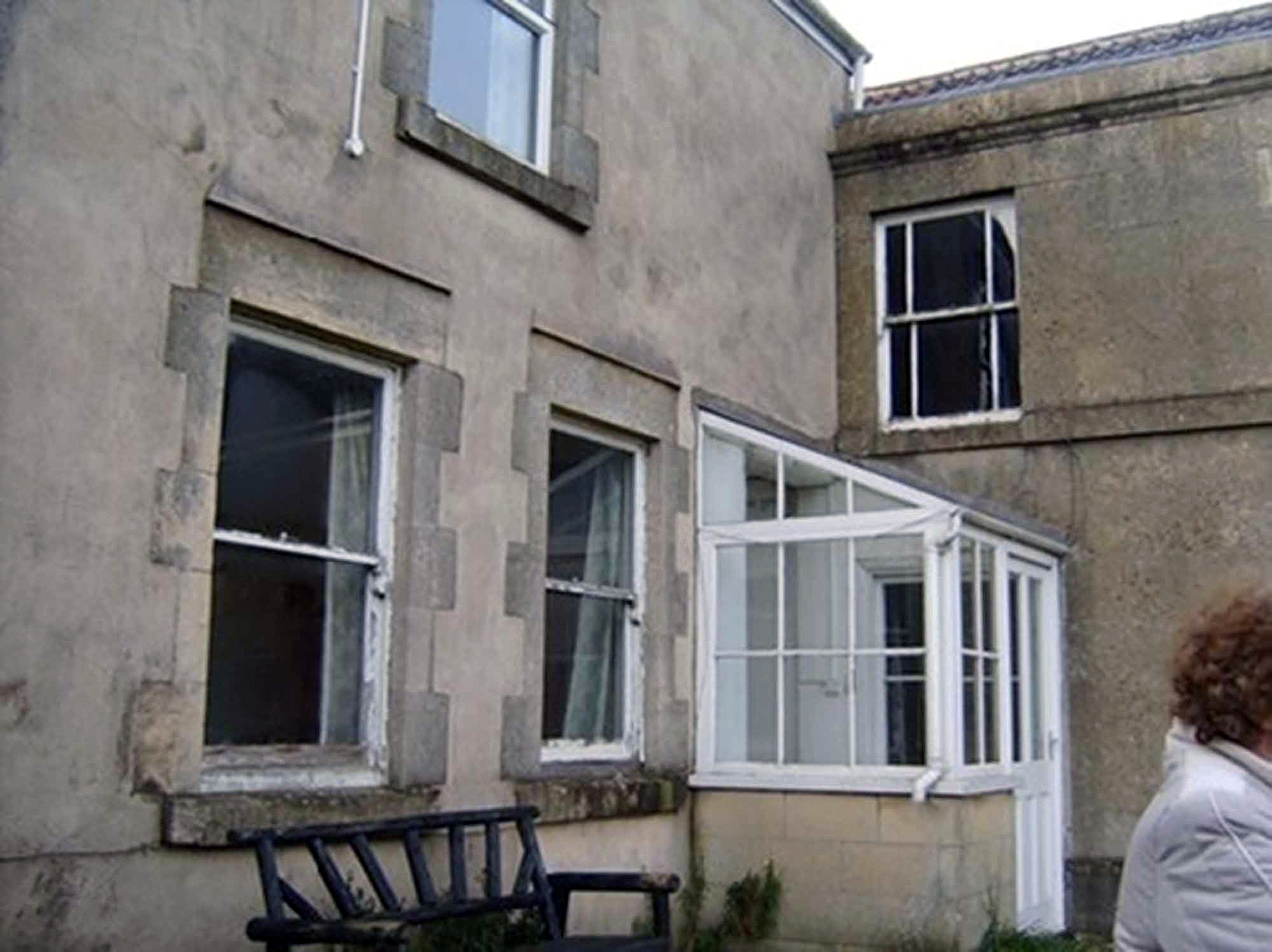
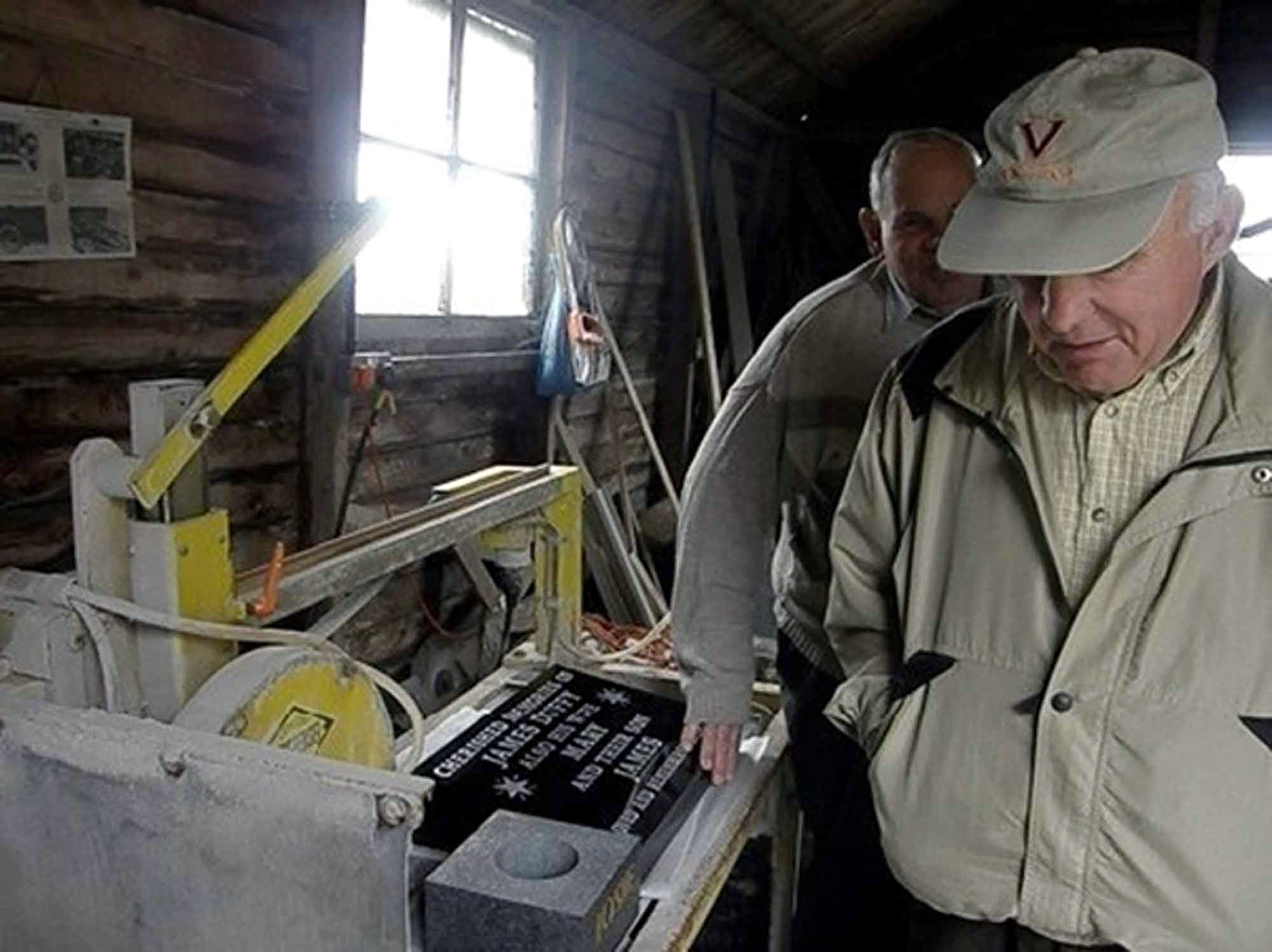
Another letter from Frederick
14th April 1940
Dear Mr. Blacker,
"I am very sorry we have not been able to go to the church to see the records. Our Rector came in and said within a few days he would make a search with me. He has been very busy and his only son joined up. (World War II beginning to hurt England. L.B.)
"As for myself we are very short of workmen. I am nearly 72 and have to again help with the letter cutting. Our young men that have joined the forces knows if the Germans were to get the upper hand everything we hold sacred throughout the world would be lost. I have had so much care in my business this last six months I have neglected your correspondence but hope to send some interesting things later on. I think George's father's name was Alexander as my father's sister, Mary, when in a situation in Bath about 1830 said her uncle, Alex called to see her on his way from London to Clutton and Mary's husband (James Tiley) told me (Frederick. L.B.) he (Alexander. L.B.) was backed to fight with a prize fighter in London to fight in a room not in a ring, I think Mace or Sayers but they would not take him on.
"George's father and my father's father (my grandfather, William) were brothers. (Frederick was right on the latter but it has proven out that Alexander was not George's father but rather Tobias. L.B.)
"I will try in every way later on to get the information your require etc. etc. but time now is very precious. I have just written to lads away joined up, (War time. L.B.) Please try to have patience with me as now I have to drive my car I am away some evenings rather late. I have not much time after I have finished in my business.
"With kind regards to you, Mrs. Blacker and family. Yours very sincerely, Frederick Blacker
Another letter which we shall share here - very little genealogy but it does give us an insight of what England was putting up with:
27 Oct 1940
Dear Mr. Blacker,
"Please forgive me for not answering your letter of 28th July before me, but with our young men gone I have to help with the lettering in the shop to keep our business going. We thought it most kind of you to offer to take any of the young Blackers but we have not any. I will not disappoint you about the names from the church registers as the evenings draw in but with so many children from the large cities here our Rector's time has been taken up. My son has had four children from London over a year and he acts as a special constable in the evenings. Our young men leave everything to join up, they are grand.
"I often look at the photo of Lindberg and his wife arriving at Liverpool with their baby for protection coming down the steps of the boat. (Lindberg's little son, Jon, had been kidnapped and they went to England temporarily for the protection of their second child, I think also a son. L.B.) Anyone would have thought he would have been the first to have tried to help us in his speeches.
"We in England have a lot to be thankful for and have confidence in our cause for liberty. Our Air Force is wonderful, especially our Spitfires. There are plenty of them brought down here by these little fighters. (Apparently referring to German planes coming down. L.B.) We see them crash. I have just seen four taken to the cemetery from one. They make collections everywhere to buy these machines. One of the books out of many in our village came to me. I was the 6th and it made up 100 pounds (Then approximately $500), only the beginning of this book.
"Charley Moody aged 72 lives retired here, grandson of George Blacker."
John: Father of our Edward Blacker who came to Almy, Wyoming
Elizabeth: Married George Mood
Charles: Charley Moody's uncle who came to America in about 1854 and became a lieutenant in the Civil War.(mentioned above by Fredrick
Perhaps it will help explain for me to diagram a small portion of our pedigree of our family to which Frederick is now referring to. Of their nine children I will show but three on the right.
Continuing with Frederick's letter: "Charley Moody said his Uncle Charley Blacker used to stay at their house, he was receiving a lieutenant's pension from the U.S. America. Charley said John Blacker (my great-grandfather. L.B.) used to keep the Miskin Inn, Mountain Ash, South Wales, and if you wrote there now and made inquiries he was sure some one would, or maybe a relation, give you some information re the late John Blacker." (Uncle William of Penrhiwceiber and Aunt Mary of Mountain Ash had, ten years before given me all the information they had. L.B.)
"I have began again this letter on Armistice Day 11th Nov." (He started it on 27th Oct. L.B.) "We have had many German and Italian planes come over to day. Our fighters have shot down 16 Germans and 13 Italians and we lost only one of ours today. They come over daily. One day we were watching about 50 at a good height when suddenly 30 of our Spitfires dived from a great height above them (who had been waiting at this great height). What a sight in a beautiful clear sky. Never before had we seen a battle like it. They were taken by surprise and shot down in all directions and burning, the smoke rising to a great height. The highest number we have shot down in one day was 185 planes.
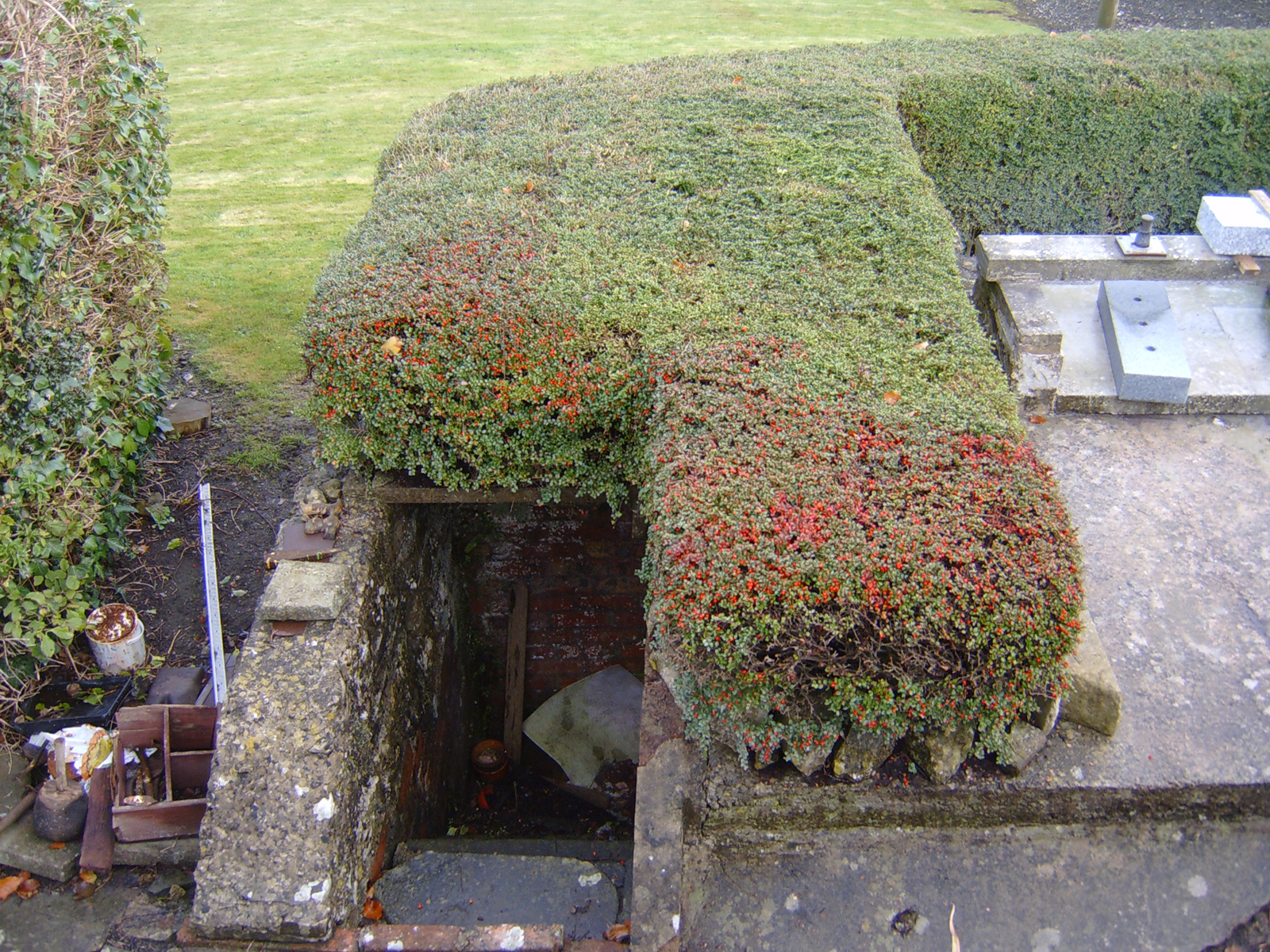 The air-raid shelter built by Fredrick Blacker
The air-raid shelter built by Fredrick Blacker
"We were pleased to hear President Roosevelt was elected again. We have the lads. As we get your machines we shall then be able to fight on equal terms with them, as though Mussolini coming against us to see what he could grab made it more difficult for us - and see what Britain has done for Italy in the past. As I am writing I have our wireless on and hearing some beautiful hymns from U.S.A., Rock of Ages etc. and now the news from the same station tells of the planes we have shot down to day but it says we did not lose one plane.
"Your stations come in quite as plain as ours here. I get them daily. I have built a good strong air-raid shelter under ground in the solid rock, reinforced with large steel girders for my family and Mary Tiley (Blacker's) son and his wife and daughter who lives close by us. Their son, John, is gone to the war. The planes are over daily and especially at night. Three bombs - we heard them - dropped last night and killed a man, his wife and child. Another night three little children - no military objectives, it's nothing but murder. We think that Mussolini helped to bring about this. He waited until we let him have the storage of oil before he declared war. Our door has just shaken - a bomb dropped somewhere.
"Nellie Tiley, Mary's daughter said about 15 years ago John Blacker's grandchildren wrote from Mountain Ash to ask if her mother could put them up for a week or two but she could not, so you see some of the family are alive. (The English people are great for having annual holidays or vacations, during which time they leave their homes to spend a week or two - sometimes singly, or couples or small groups - from which they take side-trips to visit points of interest for relaxation. Naturally the visitors expect and are willing to pay for such facilities. Undoubtedly it was such an experience John's grandchildren from Mountain Ash were arranging for. L.B.)
"I will endeavor to get the church register information you wish as soon as ever possible.
"We are all in good spirits and feel confident, with American help, we shall pull through. With kind regards. Hoping you and the family are quite well,
Yours sincerely,
Frederick Blacker"
Of two or three letters which Frederick wrote subsequent to the letters already quoted we have, in our files, parts of letters - only remnants. The British mail censors, in the process of their duty, actually opened and read the letters and cut out many portions which, undoubtedly, they felt shouldn't get into the hands of the enemy in case the mails were intercepted. In some cases, only a portion of the page was allowed to come. When, as Frederick did to conserve paper as well as weight, wrote on both sides of the sheets, that information on the back was lost as well as that which was cut out. In reality the final product which arrived was oft times undecipherable because of the parts being missing.
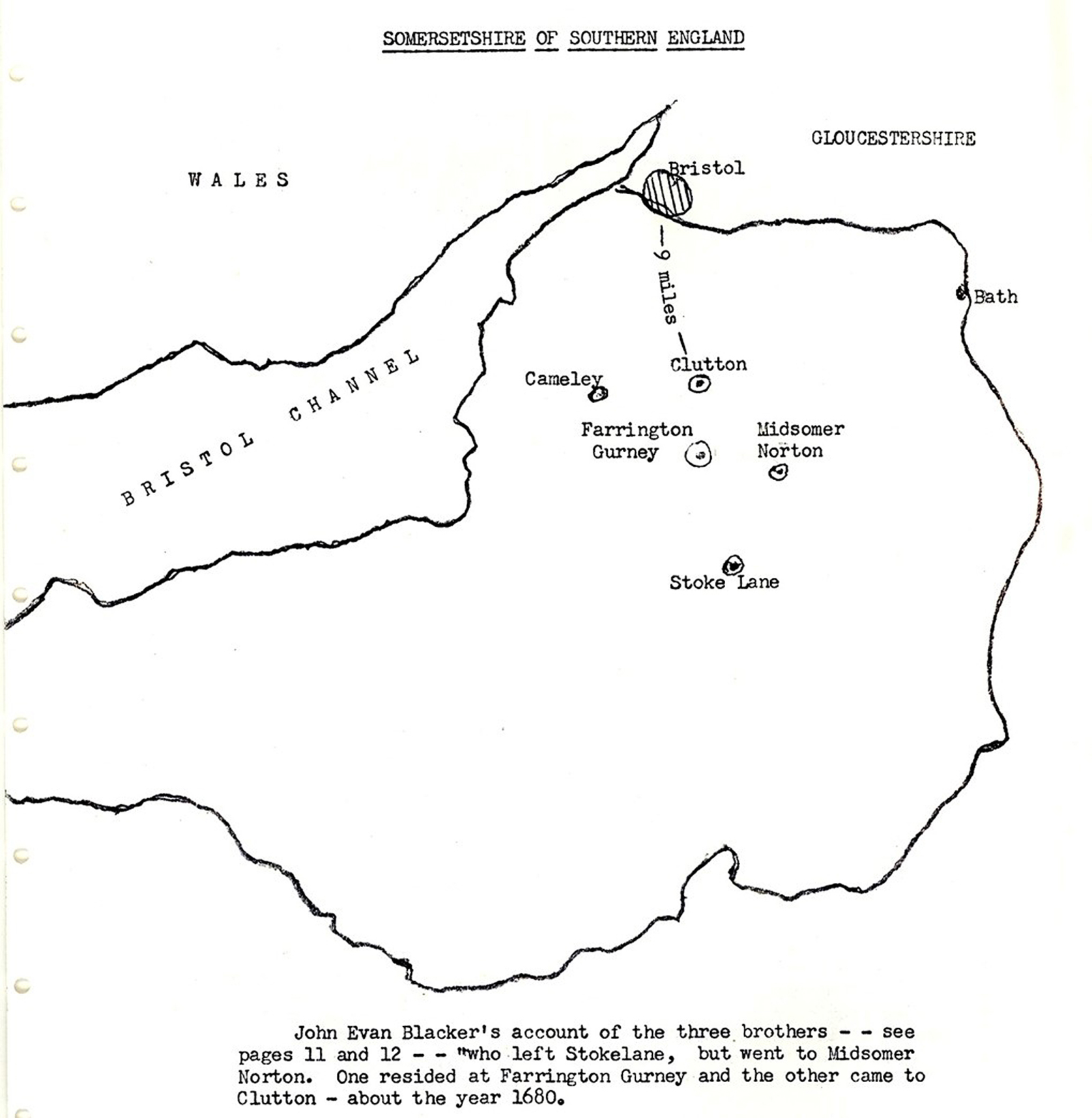
See the map of the Bristol-Clutton area here. From the remnants of these letters an attempt will be made to pass on to the reader what may make sense. In this particular letter, the year is not indicated on anything left, however, the date 25th November is intact. It undoubtedly was in the year 1940, the year of the London blitz by the Germans.
Last evening when we were in church the German and Italian planes came over - 100 of them, and made hell of our town of Bristol nine miles from here. Our hospitals, museums, halls, two cemeteries, old churches built 700 years. It was like looking at a furnace from here after four hours of constant bombing. They are afraid to come now in daylight as our Spitfires can take on ten to one. We sincerely hope the U.S.A. will give us all the help possible in planes and shipping. They will try hard to invade us shortly. We are doing our little. Our people are bitter against the Italians. We could not have believed they would turn out so deceitful. They cross over our place nightly, when we are down in our strong shelter as the bombs drop in the fields around and the place lighted up with flares. We have the lads if we can get the planes this coming winter. We are all in the best spirits.
"We were surprised at bombing Bristol as they said - - - - should make their capital - - - of course to attack - - - they say the Western Hemisphere - - - .
" - - - I am writing tonight to R. Blacker 43 Pine Crest, Toronto, Canada. He represents Pitman's Short Hand works there - who was at his late father's funeral - - - at - - - two years ago. I took him a record of his family relation with ours, (Putting it together it appears the funeral was held at Stratton-on-the Foss, about 10 to 12 miles south of Clutton. L.B.) It (relationship) began about two centuries ago when one brother built the Public House now called the Railway Hotel for his other brother. This record was written by the landlord, John (Evans) Blacker about 60 years ago (actually 1881. L.B.) He (now referring to the younger Rowland Blacker of Canada. L.B.) did not return this but took it away to America. When I get it you shall have a copy. It tells how our family came from Stoke Lane, via Stoke St. Michaels 14 miles from Clutton.
"Three brothers in 1611 and other information." (If my memory serves me correctly it was 1680 in John Evans Blacker's original account. The letter has been cut into so much by the censors that this portion of his letter will have to be put aside. L.B.)
Another portion of another letter:
"It is now the 29th February" (No year is mentioned but it is now probably 1941. L.B.) "The weather has been so severe, never knew anything like it. I have been laid up for six weeks with cold on my chest and the flu. Our Rector is a little better and - "(the entire sheet - both sides naturally - has been cut off from this point. L.B.)
"I enclose you a letter of the late Dr. Blacker. His widow's address, Mrs. Blacker, Bickley House, Clevedon, Som.," (According to the gazetteer this home is 14 miles southwest of Bristol, considerably further than his address of 1909. L.B.) (And continuing his letter - speaking of the doctor's widow): "She is a nice lady. He lent me a Book of the Blacker family history as under I copied the title of book, "A History of the Family of Blacker of Carrick Blacker."
This last mentioned history is the one referred to in Chapter One of this account. Also, this is the widow I referred to at the bottom of page one of this account and who mailed me - probably the very copy the Dr. had loaned Frederick. She mailed her copy stating I could keep it for she was no longer interested in it - an example of how paths cross during one's lifetime. Perhaps parts of one more letter from Frederick is sufficient in making his acquaintance - this is the last letter received from him so far as can be determined from our file - sixteen years of occasional letters - all interesting and helpful.
16th October 1946 Dear Mr. Loyn Blacker,
"After a little visiting he writes: I am the Church warden here and have been in the choir 71 years under 5 rectors whose photos I have had in big frames hung in our church. The first rector came here in 1814 and was rector for 64 years and I sung over him as a choir boy when he was buried in 1870 in a vault in the chancel where I am still sitting and I have the Bible given me by the family with my name written that I sung over him.
"Our present Rector, Rev. D.D. Galloway came here 2 1/2 years ago and I got him to search the registers in the great old oaken chest with three keys to it - one key for the Rector and one key each for the two churchwardens - very heavy iron work on it for your family records which I gave him your address and I think you acknowledged it etc." (Yes, I asked for every entry of Blackers in christenings, marriages and burials from the first entry, 1693 to and including 1850. Rev. Galloway copied 121 burial entries, 62 marriage entries, however the first marriage record was not until 1757. Apparently the earlier ones were lost or destroyed. Also included in the order were 144 christening entries showing child and parents. L.B.)
Continuing with the letter:
"I am keeping well and do a little lettering in our shop. We have plenty of work, and in money well off, but find it most difficult to live on the fat rations of one ounce of lard a week for each person and now to be two ounces of bacon every fortnight (2 weeks) at my age - 80 the 28th of next May if I live.
"Is there any way you could send us a little fat (shortening) or bacon. I should not forget it. Charlie Moody aged about 82 a grandson of George Blacker is healthy, full of vigor and interesting in talk - lives 1/4 mile from us. He has a pension - his wife is dead, named Chievers." (It appears we have lost the last page to this letter. Supposedly he closed by his signature as usual.)
We were living in Ontario, Oregon at the time of this letter and prepared a package of several pounds of shortening, cured bacon and other items which we felt Frederick and his family would like and shipped it via boat. We had been helped immeasurable with our genealogy thru this man who proved to be very knowledgeable of our family history. Subsequent to his furnishing us with the family data, we have either confirmed it ourselves by obtaining copies from the parish registers but, also, the professional researchers were given the data we had received and they, while researching on allied lines had an opportunity of confirming what we had. Frederick was well aware that we appreciated his interest in family history and never a letter went his way from us but that he was told of that appreciation.
In a subsequent letter by his daughter, Freida, following his death she wrote, "I lost my father in 1948 aged 80. We miss him very much, as you know he knew so very much of the Blacker history. My brother is carrying on the monumental business established 1716". Our last correspondence with anyone from Clutton was 28th of July 1954, when Frieda wrote. In her last letter she expressed herself as not being able to help with family research questions I had asked but she says of it,
"I have written to several families, three to be correct, with the name of Blacker, typing a copy of your letter so I hope you will get information from other Blacker families which you may be able to link back somewhere but all of a different family tree I expect.
"About three years ago a Mrs. D.S. Wyper, 108 Woongarr Street, Bundabert, Queensland, Australia, called at our house. They came over here to London for a holiday visiting the old country, and she called at Clutton being that she had heard her mother speak of it, she was a Blacker, apparently the "George Blacker" side so she may be relation to you.
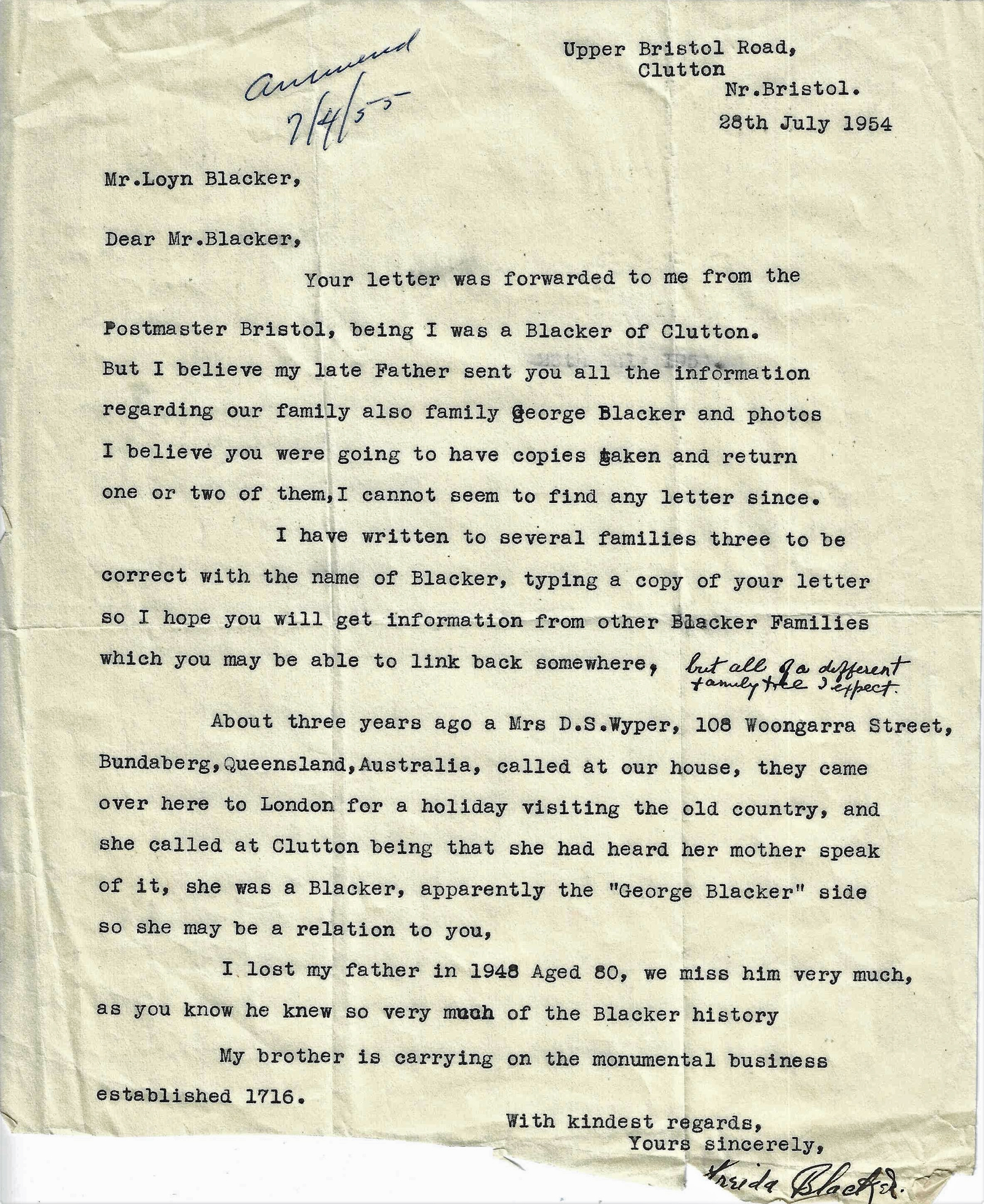 The Letter from Freida Blacker telling of her father's death
The Letter from Freida Blacker telling of her father's death
It is shameful that I did not write to Queensland to make inquiry. This Mrs. Wyper could be related to the Blackers of New South Wales. She does not show up on their charts by her married name, however, she may be on the charts by her given name only or she may be our lineage since Grandpa's (John's) brother, James Upcutt BlackerHe was christened James Upcott Blacker on 4 December 1831 in Clutton, Somerset and buried 20 March 1833 in Clutton. He never did go to Australia. , according to the old family Bible, went to Australia from Clutton about the time his brothers came to the U.S. in about 1854. L.B.)
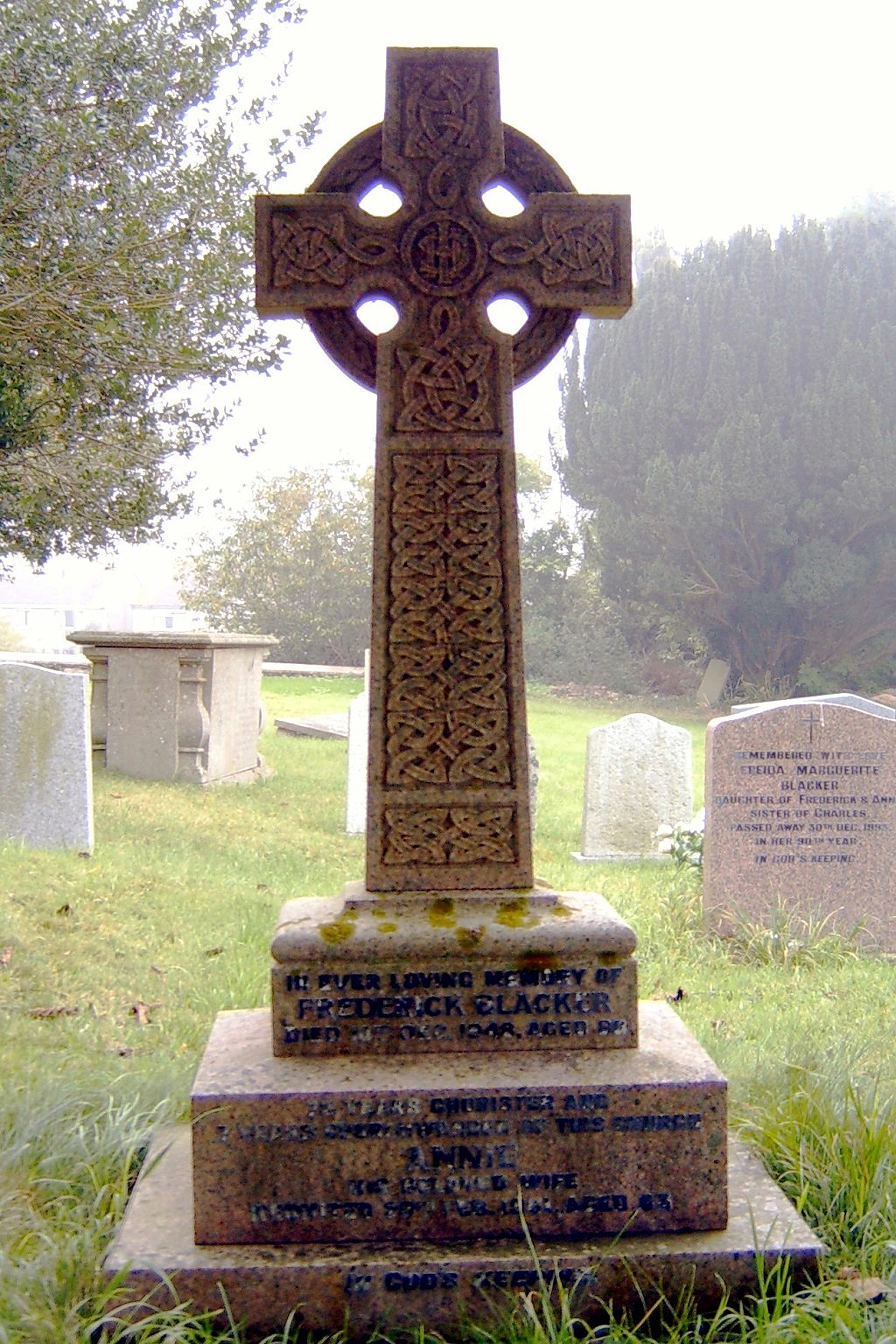 Frederick Blacker's headstone in the Clutton Cemetery
Frederick Blacker's headstone in the Clutton Cemetery
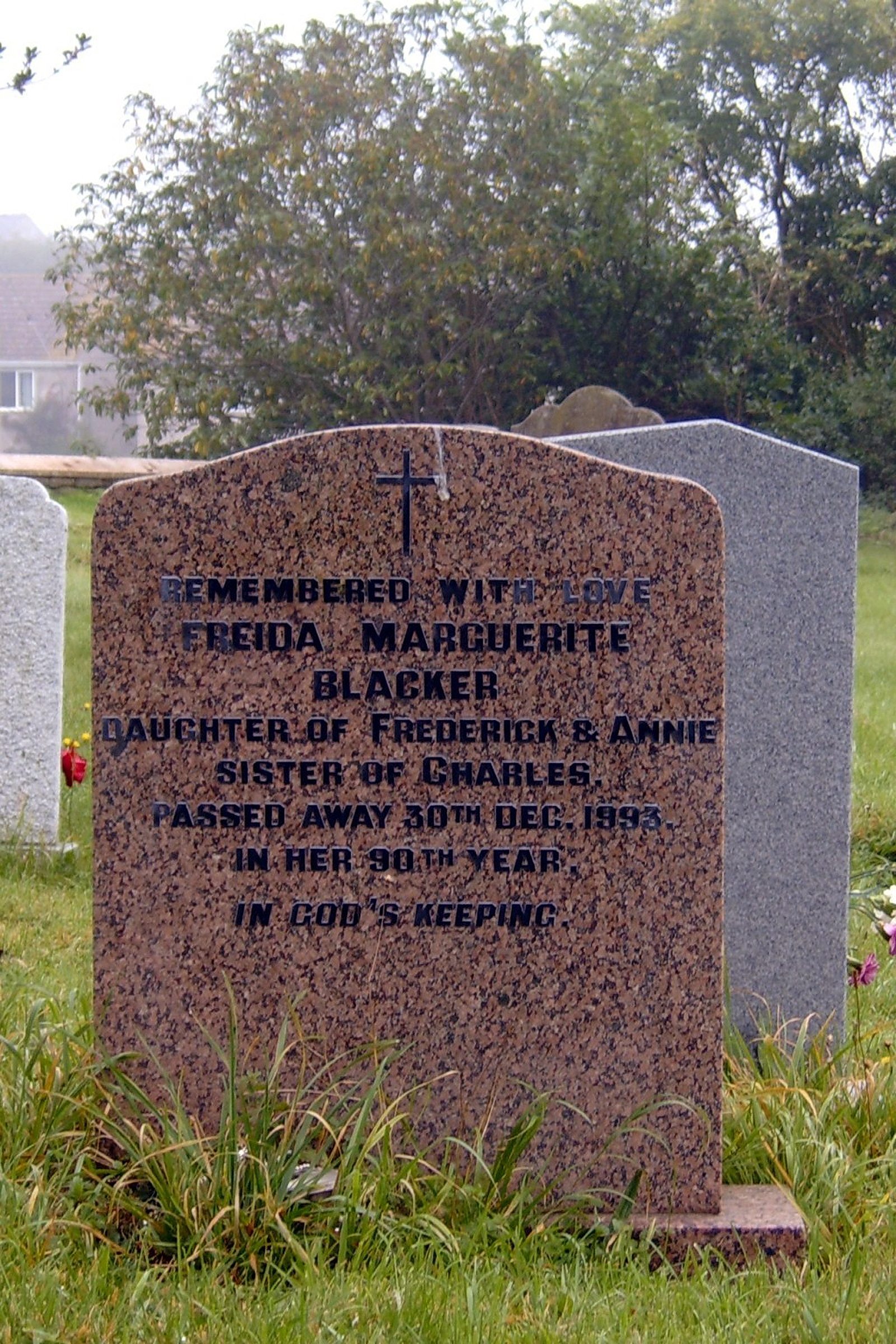 Freida Blacker's headstone near her father's.
Freida Blacker's headstone near her father's.
Frieda inherited the business when her brother, Charles died. She never married so she sold the business to a man named Higgins who still ran it in 2006.
It is interesting to note that most of the headstone work in Clutton Cemetery since 1716 was done by Blackers.
Ruth Blacker Waite